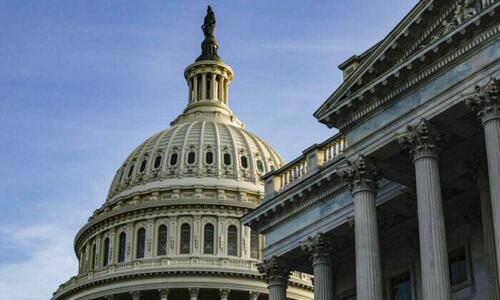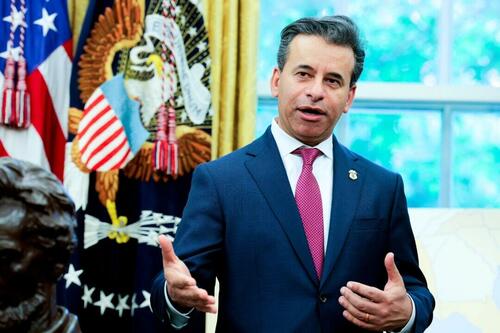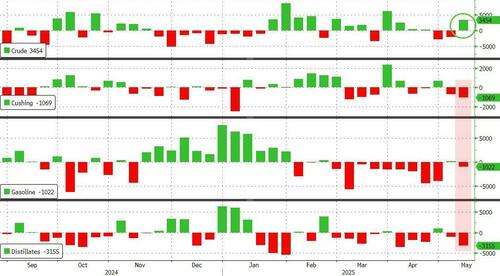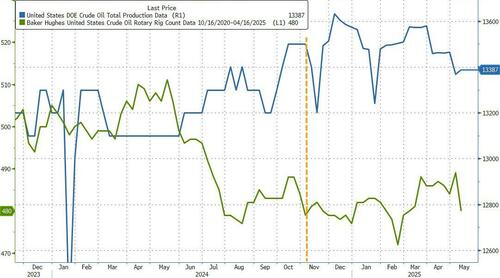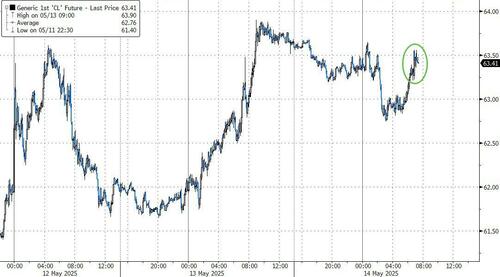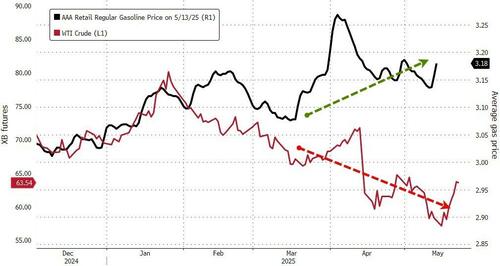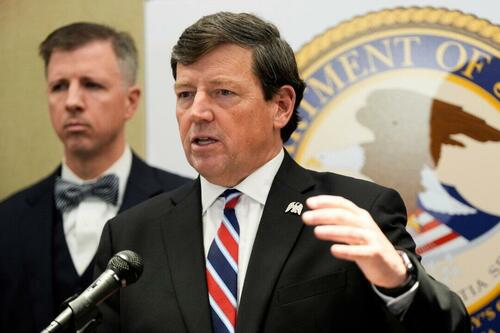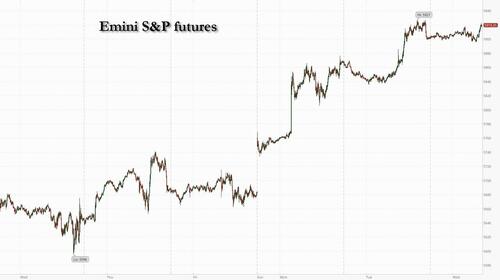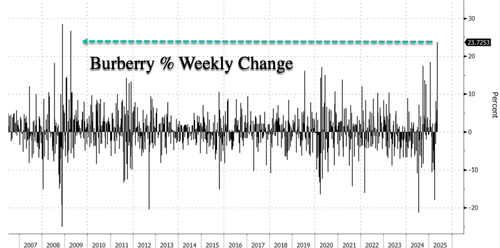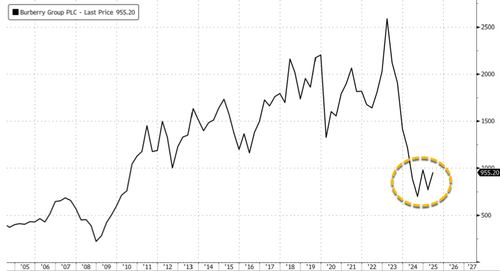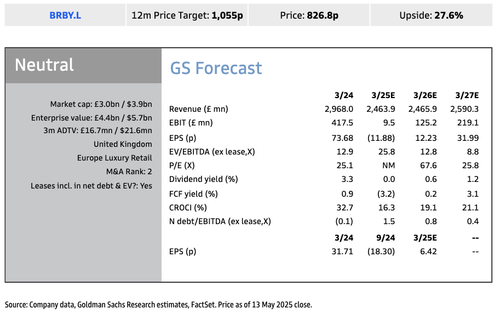One can readily admit that the Magisterium's manner of expression does not seem very easy to understand at times. It needs to be translated by preachers and catechists into a language which relates to people and to their respective cultural environments. The essential content of the Church's teaching, however, must be upheld in this process. It must not be watered down on allegedly pastoral grounds, because it communicates the revealed truth.
Distinction Matter - Subscribed Feeds
-
Site: LifeNews
New York Governor Kathy Hochul cares more about abortion than women and babies.
For the second time, Hochul is covering up for an abortionist who is illegally selling abortion pills in pro-life states.
A Louisiana woman killed her 20-week-old unborn baby with the abortion pill and threw her baby in a garbage can.
Click here to sign up for pro-life news alerts from LifeNews.com
That’s the shocking story from a pro-life state where officials are pursing potential charges against a New York abortionist who is violating the state’s pro-life law to illegally mail abortion pills to women.
Louisiana’s attorney general mentioned the shocking case during testimony yesterday in the state legislature. She also highlighted New York-based abortionist Margaret Carpenter, who is now under investigation again for selling the abortion pill used to kill the baby.
Carpenter allegedly mailed the abortion drug to another woman in the state, this time located in the city of Shreveport. The Shreveport woman was 20 weeks pregnant when she took the abortion medication and subsequently went into labor, Attorney General Liz Murrill said during a testimony for a pro-life bill.
But Hochul is protecting the abortionist from being held accountable and says she won’t sign any extradition order making it so Louisiana can enforce its law.
“We’re not going to stop trying to extradite her and prosecute her for the crimes that she’s committing in our state,” she said, referring to Carpenter.
“Anti-choice zealots can file as many cases as they want. In New York, we protect our providers,” the governor posted to X.
“Let me be clear: we will never comply with Louisiana’s extradition request. Not now, not ever.”
A Louisiana grand jury indicted Carpenter in January for violating a state law after she illegal mailed an abortion pill to another Louisiana resident.
Hochuel refused to help Louisiana with that indictment as well.

The post New York Gov. Kathy Hochul Covers for Abortionist Who Illegally Sells Abortion Drugs appeared first on LifeNews.com.
-
Site: AsiaNews.itA source in mainland China spoke to AsiaNews about the election of a pontiff born in a country that, according to state propaganda, is its archfoe against whom to flaunt China's superiority. Yet, the open gaze of Chinese Catholics towards Leo XIV shows, once again, that believing is freedom, and that a Chinese does not become Catholic if they have not first accepted, internalised, and then freed themselves from the 'international tensions' that this entails.
-
Site: RT - News
Poland wishes to remain only a regional NATO “logistics hub,” the country’s top officials have said
Poland has no plans to send its military to Ukraine in any role, the country’s top officials have said, responding to remarks by Keith Kellogg. US President Donald Trump’s special envoy had said Warsaw’s troops could be a part of a “resilience force” to be deployed to the country.
Polish Defense Minister Wladyslaw Kosiniak-Kamysz said on Tuesday that was not the case, stating that his country would only serve as a “logistics hub” and the government “does not plan and will not send Polish soldiers to Ukraine.”
“This is the clear position of the government, the president, and all political forces in Poland. Poland sees its very important role – and we are talking about this within the coalition led by Great Britain, France, most European countries, NATO countries – in stabilizing the situation in Ukraine after the long-awaited ceasefire or peace as a country supporting the logistics hub, infrastructure security, and protection of NATO’s eastern flank,” he said.
The message was further reinforced by Polish Foreign Minister Radoslaw Sikorski on Wednesday, when the top diplomat told web portal Onet that “Kellogg could have overinterpreted the fact that Poland would be part of this operation if it took place.”
Read more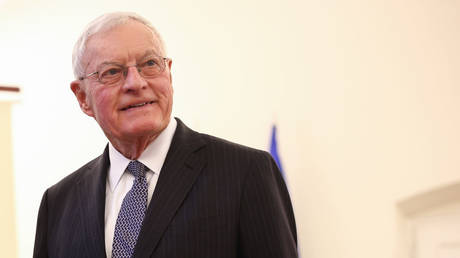 Trump envoy reveals NATO troop deployment plans for Ukraine
Trump envoy reveals NATO troop deployment plans for Ukraine
“Stop manipulating, the head of government, the minister of defense, and I repeat: Poland will NOT send Polish soldiers to Ukraine,” Sikorski wrote on X shortly after the conversation with the outlet.
Trump’s special envoy told Fox Business on Tuesday that Washington was in talks with its European NATO allies about sending military contingents to Ukraine as part of a possible post-conflict settlement. Kellogg spoke about the potential “resilience force” being deployed west of the Dnieper River, which would place them “outside the contact zone.”
“This is a force referred to as the E3, but it’s actually now the E4 – when you include the Brits, the French, and the Germans, and in fact, the Poles as well,” he claimed.
A group of European NATO member states has for months been trying to muster a “coalition of the willing” for what they describe as a post-conflict peacekeeping force. Thus far however, Kiev’s backers have failed to agree on its exact goals, mission, or shape.
Russia has unequivocally rejected the presence of NATO troops in Ukraine in any form, arguing it would pose a direct threat and could ultimately trigger a nuclear conflict.
-
Site: RT - News
The bloc’s members are reportedly rushing to agree to spend 5% of their GDP on defense ahead of a summit next month
NATO member states are struggling to overcome divisions and define the details of an increase in spending targets demanded by the US ahead of the bloc’s annual summit in The Hague, Bloomberg has reported.
US President Donald Trump has demanded that European NATO states spend 5% of their GDP on defense, warning that Washington may reconsider its commitments to the bloc if they fail. According to NATO’s latest report, ten of the bloc’s 32 members do note even spend 2% of GDP on defense, a baseline bloc target.
The US has argued that European NATO members must take primary responsibility for their own defense. Secretary of State Marco Rubio recently described the current dynamic as the US alongside “a bunch of junior partners that aren’t doing their fair share.”
NATO Secretary General Mark Rutte is reportedly pushing for a compromise spending target of 3.5% of GDP within seven years, plus an additional 1.5% for wider defense-related spending, Bloomberg has cited senior diplomats as saying.
Read more German defense minister pushing for ‘drastic’ budget hike – Reuters
German defense minister pushing for ‘drastic’ budget hike – Reuters
Foreign ministers are meeting in Türkiye on Wednesday and Thursday to define what qualifies under the 1.5% category, including military mobility, dual-use goods, and cybersecurity.
NATO defense ministers met in Brussels on Wednesday to debate the 3.5% target and review “highly classified lists of weapons and other capabilities” that are part of the bloc’s “ambitious” militarization drive, according to Bloomberg.
The talks come as Russian and Ukrainian delegations are expected to meet in Istanbul on Thursday to discuss possible steps toward ending the conflict.
Earlier media reports speculated Trump might skip the summit if the 5% spending demand is not met. US Ambassador to NATO Matthew Whitaker insisted on Tuesday that Trump will attend.
READ MORE: Russian delegation will be waiting for Ukrainians in Istanbul – Kremlin
The increased militarization of the bloc follows claims, long denied by Moscow, that Russia could attack a NATO member in coming years. Russia has accused the bloc of “irresponsibly stoking fears” of a fabricated threat.
Russian Foreign Ministry spokeswoman Maria Zakharova said the bloc “has degraded into an openly militarized entity.”
-
Site: RT - News
It could help stabilize the Middle East and ultimately serve in the interests of the Jewish state
Media reports are increasingly suggesting that President Donald Trump may announce US recognition of a Palestinian state during his upcoming visit to the Middle East.
The White House is preparing to unveil a plan that would support the establishment of a Palestinian state – explicitly excluding Hamas, The Media Line reports, citing a Gulf diplomatic source. Such a move, the source claims, could dramatically shift the regional balance of power and pave the way for new normalization agreements between Israel and the Arab states.
The visit, scheduled from May 13 to 16, will include official stops in Saudi Arabia, Qatar, and the United Arab Emirates – countries with significant influence on both the Israeli-Palestinian conflict and the region’s economic and energy dynamics. Notably, Saudi Arabia was also Trump’s first foreign destination during his initial term in office, underscoring its continued strategic importance.
A key component of the trip will be the US–Gulf Cooperation Council summit, set for May 14 in Riyadh, where Trump is expected to outline a renewed American vision for the region. In addition to security and diplomacy, the summit will cover trade, investment, and potential economic agreements, including possible tariff exemptions for American goods in the region as part of broader investment deals.
Analysts believe that if Trump does recognize a Palestinian state, it will not only mark a diplomatic milestone but also serve as a catalyst for expanding the Abraham Accords, the US-brokered normalization deals between Israel and several Arab nations which were introduced 2020. Trump officials, including Jason Greenblatt and Richard Goldberg, have set goals to broaden these accords by 2026, viewing Palestinian statehood – under revised terms – as key to Saudi participation.
Read more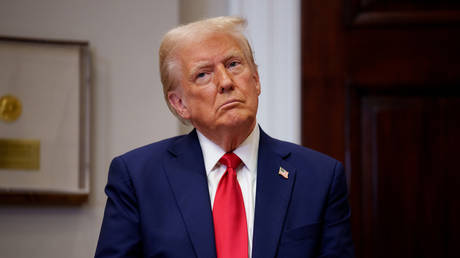 Trump could recognize Palestine – media
Trump could recognize Palestine – media
Riyadh has repeatedly stated that normalization with Israel is contingent upon a credible roadmap toward Palestinian statehood and an end to hostilities in Gaza. A US announcement recognizing Palestine could thus serve as a turning point, easing Saudi entry into the Abraham Accords and shifting the regional paradigm.
Qatar’s position will also be pivotal, given its mediating role between Israel and Hamas; excluding the militant group from a future state will place Doha at the center of a new diplomatic equation.
Beyond the political stakes, the visit will also emphasize economic cooperation. The Trump administration is aiming to finalize trade and investment deals while promoting global oil price stability, which it views as vital to economic recovery in the US.
Jared Kushner, Trump’s son-in-law and former advisor, is expected to play a key role in negotiations with Saudi Arabia, given his close personal ties to Crown Prince Mohammed bin Salman and his prior role in the original Abraham Accords. If this initiative proceeds, it could redefine both American strategy in the region and the future of the Israeli-Arab normalization process.
Why does Israel hold exceptional importance for the US?
The relationship between the US and the State of Israel is not simply a strategic alliance between two nations – it is a unique phenomenon in international relations, built on a combination of geopolitical interests, shared values, historical ties, and deep cultural and religious connections. US support for Israel has long been systemic, bipartisan, and remarkably stable, making it one of the few enduring constants in American foreign policy, largely unaffected by changes in administration or global disruptions.
From a strategic standpoint, Israel plays a central role in American policy in the Middle East, a region that has been at the heart of global politics throughout the 20th and 21st centuries. Since Israel’s founding in 1948, the US has viewed it as a natural ally in a region often dominated by hostile or, during the Cold War, pro-Soviet regimes. Israel quickly proved itself to be a militarily capable and politically stable state, with a strong pro-Western orientation. Unlike many of America’s other regional partners, Israel has avoided revolutions, regime change, or anti-American shifts, making it not only useful but reliably aligned with US interests.
Yet strategic logic alone cannot fully explain the depth of US-Israeli ties. A strong ideological and cultural affinity reinforces the relationship. In the American public and political imagination, Israel is often portrayed as “a democracy among dictatorships” – a nation that shares core Western values such as a liberal economy, pluralism, and freedom of speech and religion. This image, consistently reinforced by Israeli diplomacy and American media, positions support for Israel as support for democratic civilization in a region seen as volatile and authoritarian.
Read more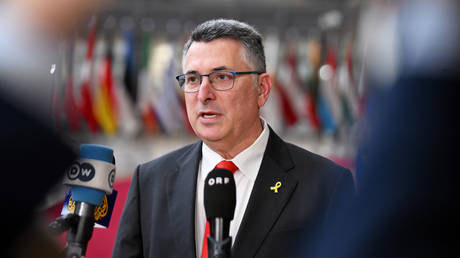 Israel issues warning over Palestine recognition
Israel issues warning over Palestine recognition
A major pillar of this support is the religious and ideological backing provided by American evangelical Christians, who make up a large segment of the Republican base. For many evangelicals, Israel is not just a political partner – it is the Holy Land, central to biblical prophecy and eschatological beliefs. According to their theology, the return of Jews to the Promised Land and the restoration of the Jewish state are signs of the approaching end times and the Second Coming of Christ. While rooted in theology, this belief has real political consequences: evangelical groups consistently pressure US leaders to offer unwavering support for Israel. Donald Trump, for example, heavily relied on evangelical backing, which played a key role in his 2018 decision to move the US embassy to Jerusalem.
Another influential factor is the American Jewish community, one of the most politically engaged and organized demographic groups in the country. US Jews have historically played a vital role in public discourse, media, academia, and – crucially – campaign financing. Organizations such as AIPAC have successfully built a durable lobbying infrastructure that secures congressional and executive support for Israel. In this context, support for Israel has become a political norm in the US, and any deviation – such as criticism of settlement policy or calls for Palestinian statehood – is often viewed as politically risky.
Historical memory also plays a powerful role. In the wake of the Holocaust, the idea that the Jewish people must have a secure national homeland gained strong moral legitimacy. For many Americans – especially those shaped by World War II and Cold War narratives – supporting Israel is seen as an act of historical justice and ethical responsibility. These sentiments are deeply embedded in American education and cultural production, making the pro-Israel stance virtually unassailable in mainstream discourse.
Together, these factors create a situation where US support for Israel transcends conventional geopolitics. It is not just a transactional partnership, but a deeply rooted political-cultural alignment shaped by overlapping strategic interests, religious convictions, historical legacies, and domestic political structures. Even when Israeli policies draw international criticism – such as actions in Gaza, settlement expansion, or restrictions on Palestinians – US support tends to remain steadfast, often in defiance of global public opinion.
This exceptional relationship is not a temporary arrangement or convenient alliance – it is part of the structural identity of US foreign policy. The idea of rethinking these ties is rarely taken seriously in American politics, as it would challenge moral sensibilities, religious beliefs, national security logic, and entrenched electoral alliances. For this reason, Israel continues to occupy a privileged position in US foreign affairs, receiving unwavering bipartisan support regardless of changes in international context or leadership in Washington.
Read more Trump announces gesture of ‘good faith’ by Hamas
Trump announces gesture of ‘good faith’ by Hamas
The evolution of US policy on Palestine
For over seventy years, Washington’s position on the Palestinian question has reflected not only the shifting dynamics of the Israeli-Arab conflict but also the broader evolution of American global priorities, ideological frameworks, and regional alliances. From its early and unwavering support for the creation of Israel to periods of active diplomacy and, more recently, attempts at strategic rebalancing, Washington’s approach has been shaped by domestic political considerations, pressures from allies, and the competition for influence in the Middle East.
In 1947, the US endorsed the UN Partition Plan that called for the division of British-mandated Palestine into separate Jewish and Arab states. President Harry Truman was among the first world leaders to recognize the State of Israel in May 1948, cementing America’s role as Israel’s primary international sponsor. However, the fate of the Palestinian Arab population – their rights, status, and national aspirations – was largely sidelined. For the next two decades, Washington viewed the conflict primarily through the lens of Cold War geopolitics, prioritizing Israel’s role as a pro-Western stronghold over the unresolved plight of the Palestinians.
It was only after the 1967 Six-Day War, in which Israel occupied the West Bank, Gaza, and East Jerusalem, that the US began to acknowledge that a lasting peace would require a solution to the Palestinian statehood issue. The Nixon and Carter administrations gradually shifted toward diplomacy, and UN Security Council Resolution 242 laid the foundation for the principle of ‘land for peace.’ President Carter’s role in brokering the 1978 Camp David Accords was a landmark, though the Palestinian issue remained largely peripheral to the Israel-Egypt peace treaty.
For years, the US refused to engage with the Palestine Liberation Organization (PLO), branding it a terrorist entity. But by the late 1980s, following the outbreak of the First Intifada and Yasser Arafat’s renunciation of violence and recognition of Israel’s right to exist, the US opened diplomatic channels with the PLO – marking a significant turning point. In the 1990s, Washington became the chief mediator of the peace process, organizing the 1991 Madrid Conference and, under President Clinton, facilitating the 1993 Oslo Accords. These agreements saw mutual recognition between Israel and the PLO and established the Palestinian Authority, formalizing America’s endorsement of a two-state solution as the only viable framework for peace.
Read more US-Israeli hostage released by Hamas
US-Israeli hostage released by Hamas
However, efforts to finalize the process faltered. The 2000 Camp David Summit, which aimed to resolve final status issues – including borders, refugees, and Jerusalem – ended without an agreement. The subsequent eruption of the Second Intifada dampened US enthusiasm for direct mediation. After the attacks of September 11, 2001, American priorities in the region shifted dramatically toward counterterrorism. Under President George W. Bush, Hamas was designated a terrorist organization, and its electoral victory in Gaza in 2006 further fragmented Palestinian leadership. Although Bush proposed a ‘Road Map to Peace,’ tangible progress remained elusive.
President Barack Obama voiced support for Palestinian statehood and criticized Israeli settlement expansion, but his administration made little headway in advancing negotiations. Secretary of State John Kerry’s efforts in the 2010s collapsed amid deep mistrust and political resistance, both in the region and in Washington, where pro-Israel lobbying groups strongly opposed any perceived tilt toward Palestinian demands.
Under President Trump, US policy took a decisive turn in Israel’s favor. His administration recognized Jerusalem as Israel’s capital, relocated the US embassy there, ended funding for UNRWA, and shuttered the PLO’s diplomatic mission in Washington. Trump’s ‘Deal of the Century’ proposed a fragmented Palestinian entity with limited sovereignty and full Israeli security control. The Palestinian leadership rejected it outright. Nevertheless, the Trump era saw the signing of the Abraham Accords, normalizing Israel’s relations with the UAE, Bahrain, Sudan, and Morocco. Palestine, notably, was excluded – its statehood effectively reduced to a bargaining chip in broader regional realignments.
The Biden administration mildly recalibrated course by restoring aid to Palestinians, reestablishing ties with the PLO, and formally reaffirming Washington’s commitment to a two-state solution. However, preoccupied with domestic priorities and strategic competition with China, the administration largely refrained from deep involvement in the peace process. The US continued to promote the expansion of the Abraham Accords, without placing significant pressure on Israel to address core Palestinian concerns.
Read more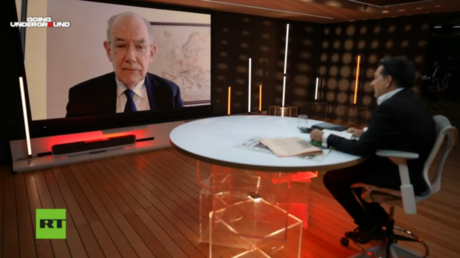 Prof. John Mearsheimer: Israel owns the Trump administration, Israel is a liability for the US
Prof. John Mearsheimer: Israel owns the Trump administration, Israel is a liability for the US
Now, reports suggest that Trump may once again shift the paradigm by recognizing a Palestinian state – this time explicitly without Hamas in its future structure. If such a move materializes, it would mark a dramatic turn in US policy and reflect a calculated effort to unlock Saudi-Israeli normalization, for which a credible solution to the Palestinian question remains a precondition.
In the long term, the recognition of Palestinian statehood – if anchored in genuine sovereignty and political viability – could prove to be a stabilizing force for the region and ultimately serve Israel’s interests by integrating it further into the Arab world. Yet such a move would clash with the hardline stance of Israel’s current right-wing government, risking a rift between Washington and Israeli Prime Minister Benjamin Netanyahu. Moreover, any serious shift toward a two-state solution would require a transformation of Israeli domestic politics, potentially leading to internal polarization and upheaval.
In this light, a possible US recognition of Palestine is far more than symbolic. It is a profoundly political act, with the power to reshape regional dynamics, recalibrate US alliances, and reignite long-stalled hopes for a just and lasting peace – but not without significant costs and risks on both sides.
-
Site: Zero HedgeAverage Americans Poised for Double-Digit Tax Cuts In 2027, Sparking Partisan ClashTyler Durden Wed, 05/14/2025 - 11:45
A sweeping Republican tax overhaul proposal, estimated to deliver double-digit percentage reductions in tax bills for average-income Americans, is drawing mounting opposition in the Senate over its accompanying cuts to health care and clean energy programs - underscoring the internal divisions complicating Republican efforts to advance a unified economic agenda.
According to a new analysis from the nonpartisan Joint Committee on Taxation (JCT), households earning between $30,000 and $80,000 would see their federal taxes drop by approximately 15 percent in 2027 under the House GOP plan. Americans earning between $15,000 and $30,000 would see an even steeper 21 percent decline - at least initially.
But those same low-income earners would see their tax bills rise sharply in later years unless extended, with increases of 12 percent in 2029 and 20 percent in 2030, the JCT found. The report attributed some of those changes to proposed reforms of the Earned Income Tax Credit (EITC), a benefit for low-income workers that Republicans argue is vulnerable to improper payments.
While the report’s topline numbers have fueled Republican claims that the proposal is middle-class focused, Democrats seized on the overall distribution of tax cuts in dollar terms, Politico reports. Taxpayers earning more than $500,000 are slated to receive an aggregate cut of about $170 billion in 2027 - nearly triple the $59 billion going to households earning $30,000 to $80,000.
The proposal has already provoked heated exchanges in the House Ways and Means Committee, where lawmakers debated the fairness and sustainability of the tax package. Democrats derided the bill as a boon to the wealthy, while Republicans pointed to new breaks for tips, overtime, and seniors as evidence of its broader appeal.
The report is not a complete picture of winners and losers under Republicans’ plans. It doesn’t include a potential deal among lawmakers to further increase the SALT cap, beyond a proposed $30,000 limit.
The report also only looks at the tax side of Republican plans, and does not account for changes in spending programs, like Medicaid. -Politico
"It's a trick," said Rep. Gwen Moore (D-WI). "You do it temporarily so you can get through the 2026 election" and "then these benefits for children and elders and workers disappear, while the tax benefits for the ultra-wealthy soar."
Senate Republicans Balk
Yet beyond the debate over tax cuts, the House plan is facing stiff resistance in the Senate for how it proposes to offset some of the revenue losses: by slashing Medicaid and rolling back key clean energy incentives passed under the Biden administration.
A Congressional Budget Office (CBO) estimate found that the House bill’s Medicaid reforms could result in 8.6 million people losing health care coverage, largely due to new work requirements, cost-sharing mandates, and restrictions on how states finance their Medicaid programs.
Several Senate Republicans voiced concern over the health care implications, especially for rural areas.
"These are working people in particular who are going to have to pay more," said Senator Josh Hawley (R-MO), referring to new cost-sharing rules. He warned that changes to provider taxes - which states use to draw federal Medicaid dollars - could reduce coverage in his state and strain rural hospitals.
"I continue to maintain my position we should not be cutting Medicaid benefits," Hawley said.
Senator Susan Collins (R-ME), said the proposed treatment of provider taxes "would be very harmful to Maine’s hospitals," echoing concerns raised by other senators from rural and Medicaid-reliant states.
Senator Lisa Murkowski (R-AK), also pointed to the disproportionate burden that Medicaid cuts would place on states like hers, calling the issue a key sticking point in ongoing Senate discussions.
Not So Fast?
In addition to health care, some senate Republicans are also wary of the House’s aggressive plans to unwind tax credits for clean energy and hydrogen development, incentives championed in the Inflation Reduction Act and credited with bringing manufacturing investments and jobs to red and purple states alike.
Senator Thom Tillis (R-NC), who faces a competitive reelection race next year, expressed concern over quickly ending climate initiatives - suggesting that the House language on energy tax rollbacks would need to be revised.
"You can’t shock the markets by doing it all at once," Tillis said of the proposed clean energy phaseouts.
Senator Shelley Moore Capito (R-WV) also flagged potential impacts to her state’s clean hydrogen initiatives, saying she would review the House’s plan to eliminate the 45V hydrogen production credit, which could affect nearly $1 billion in planned federal support for the Appalachian Regional Clean Hydrogen Hub.
The House GOP plan is expected to pass narrowly along party lines, but Senate Republicans made clear this week that the legislation will require significant changes to win broader support in the upper chamber.
"We are coordinating very closely with our House counterparts," said Senate Minority Whip John Thune of South Dakota. "We know they have to get 218 votes... but it’s likely we’ll have a Senate substitute."
As Republican leaders try to reconcile competing priorities — delivering tax relief, restraining federal spending, and maintaining political support in swing states — the path forward for the legislation remains uncertain.
"How we navigate this," said Murkowski, "is something we’re all trying to wander through."
-
Site: Zero HedgeAnnouncement On COVID-19 Vaccines For Kids Coming Soon: FDA CommissionerTyler Durden Wed, 05/14/2025 - 11:25
Authored by Zachary Stieber via The Epoch Times,
Health officials are poised to make an announcement on COVID-19 vaccines, the commissioner of the Food and Drug Administration (FDA) said.
“That is something that’s being discussed right now,” Dr. Marty Makary, the commissioner, said in an interview, released on May 12, after being asked by political activist Charlie Kirk about whether COVID-19 vaccines will remain on the childhood vaccination schedule.
“I think you’re going to see some announcement on that in the coming weeks, but I know they are trying to review all of the scientific data.”
The Centers for Disease Control and Prevention and the Department of Health and Human Services, which maintains the schedule, did not respond to a request for comment.
Makary told Kirk that there’s no evidence available at this time that supports giving healthy children additional COVID-19 vaccine doses.
“That evidence does not exist, and so we’re not going to rubberstamp things at the FDA,” he said.
“I don’t think you’re going to see the CDC pushing COVID shots in young, healthy children.”
The FDA commissioner, who expressed concern before joining the agency about vaccinating children, noted that there is no data from randomized, controlled trials for the COVID-19 vaccines that are currently available. The regulatory agency cleared the vaccines from Moderna, Pfizer, and Novavax in 2024, pointing to animal testing and data from previous versions of the shots.
“There’s no good randomized control data that the current version, the latest formulation, of the COVID shot, is necessary for young, healthy children. Other leading countries in Europe have recommended against it,” Makary said.
“So I think you’re going to hear something forthcoming.”
The CDC, in 2023, added the COVID-19 vaccines to the vaccination schedule, following a recommendation from its vaccine advisory panel.
The same panel said in April that it is leaning toward narrowing the current universal recommendation for COVID-19 vaccination. In the same meeting, officials noted that the United Kingdom and Australia are among the countries that do not recommend COVID-19 vaccine boosters for healthy children.
Health Secretary Robert F. Kennedy Jr. said that same month that officials were considering removing the COVID-19 vaccines from the schedule. Makary has said he would support that move.
The CDC, which has an acting director at present, has not commented on the prospect of the schedule being adjusted.
The American Academy of Pediatrics is among the organizations that support the current COVID-19 vaccine recommendations. The group says on its site that the vaccines are safe and effective.
The FDA is set to meet with its vaccine advisers on May 22 to discuss selecting updates to the COVID-19 vaccines, with Novavax saying it plans to participate in the meeting. Pfizer and Moderna have not responded to queries.
-
Site: RT - News
The US president has reportedly backed off the renaming of the Persian Gulf in light of ongoing nuclear talks in Oman
US President Donald Trump has backed off a reported plan to rename the Persian Gulf, CNN wrote on Wednesday, citing a source familiar with the matter. The move was described as a concession to Iran amid ongoing nuclear talks between the two countries.
Earlier this month, the Associated Press reported that Trump was planning to refer to the waterway off Iran’s southern coast as the “Arabian Gulf’ during his May 13-16 Middle East trip. However, Trump later told reporters he would “have to make a decision,” adding that he did not want to “hurt anybody’s feelings.”
The US president reversed the idea in recent days, the source said, as Tehran has signaled strong opposition to the renaming amid ongoing talks.
Washington and Tehran have held several rounds of negotiations in Oman over Iran’s nuclear program. The talks, described by both sides as constructive, have been overshadowed by rising tensions in Yemen, where the US and UK have intensified strikes against allegedly Iran-backed Houthi militants. Trump’s announcement of a bombing pause in early May was aimed at building momentum for the ongoing talks, sources told CNN at the time.
Speaking at the Gulf Cooperation Council summit in Riyadh, Saudi Arabia on Wednesday, Trump said he wanted to “make a deal” with Iran.
Trump pulled the US out of the 2015 UN-backed nuclear deal during his first term, accusing Iran of violating the agreement – a charge Tehran denies. The Islamic Republic began scaling back its commitments after the 2020 US drone strike that killed Iranian General Qasem Soleimani.
Read more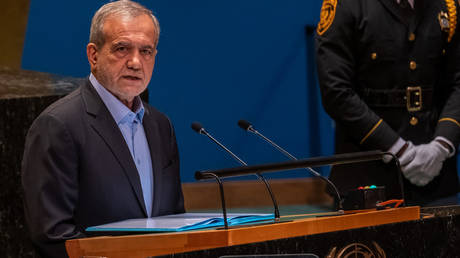 Iran rejects ‘unacceptable’ US nuclear demand
Iran rejects ‘unacceptable’ US nuclear demand
The UK, Germany, and France have urged Iran to abandon its nuclear program in the coming months or face new sanctions, UK Ambassador to Israel Simon Walters said in February.
Iran has also been accused of increasing production of near-weapons-grade uranium, which it denies.
The naming of the gulf has long been a point of contention between Iran and the Arab states. Tehran insists on calling it the Persian Gulf, citing historical evidence and ancient maps linking the area to its territory. Saudi Arabia, the UAE, Iraq, and others, however, refer to it as the Arabian Gulf or simply ‘the Gulf.’
Iranian Foreign Minister Seyed Abbas Araghchi called the renaming proposals “indicative of hostile intent toward Iran and its people.”
Trump has previously used symbolic renaming in foreign policy. In January, he signed an executive order to rename the Gulf of Mexico the “Gulf of America.”
-
Site: RT - News
The European Commission acted improperly by refusing to release communications with Pfizer to the media, the ruling states
The European Commission wrongly denied the media access to secret text messages between its president, Ursula von der Leyen, and the CEO of pharma giant Pfizer, exchanged during negotiations of a multi-billion dollar Covid-19 vaccine deal, the Court of Justice of the European Union ruled on Wednesday.
The so-called “Pfizergate” case centers on a 2021 interview von der Leyen gave to the New York Times (NYT) in which she claimed she had been negotiating a deal for 900 million COVID vaccine shots with Pfizer CEO Albert Bourla via sms messages.
The NYT subsequently filed an access request for the messages, to which the EC claimed the texts, which have never been released, were not in its possession.
The court ruled that the EC “cannot merely state that it does not hold the requested documents but must provide credible explanations enabling the public and the Court to understand why those documents cannot be found.”
It also criticized the Commission for failing to justify why the texts were not retained and to clarify how they were deleted.
Read more Von der Leyen commission loses Covid vaccine case
Von der Leyen commission loses Covid vaccine case
In response, the EC said it recognized the need for greater transparency and promised to issue a new decision with more detailed reasoning. It did not, however, commit to releasing the messages in question. The ruling can be appealed to the European Court of Justice.
A similar CJEU judgment last July found that the EC lacked transparency in how it negotiated vaccine contracts with Pfizer and AstraZeneca. The deals, signed in 2020 and 2021 and worth approximately €2.7 billion ($3 billion), were shielded from disclosure to European Parliament members on the grounds of protecting commercial interests.
-
Site: Euthanasia Prevention CoalitionAlex Schadenberg
Executive Director, Euthanasia Prevention Coalition Liz Carr with Pam Duncan-GlancyCraig Paton reported for the Independent on May 13, 2025 on the Not Dead Yet UK rally outside Holyrood (Scottish parliament) as the Liam McArthur assisted suicide bill was debated and voted on.
Liz Carr with Pam Duncan-GlancyCraig Paton reported for the Independent on May 13, 2025 on the Not Dead Yet UK rally outside Holyrood (Scottish parliament) as the Liam McArthur assisted suicide bill was debated and voted on.
The rally opposing assisted suicide featured actress Liz Carr and Scottish Labour MSP Pam Duncan-Glancy.
Paton reported that Silent Witness star Liz Carr told campaigners outside the Scottish Parliament that:
“I am so fed up of having to answer strangers’ questions, even in this day and age, who think that being us must be the worst thing imaginable,” she said to campaigners, which included a number of disabled people.
“That having pain, having difficulty with everyday activities, must mean that it would be better if we were dead – that is not the case.”
Paton reported that Liz Carr qualifies for assisted suicide under the bill.
“But it also has a definition that I would qualify under, I would define myself as a disabled person, but actually the definition of having a progressive condition, I would come under that.
“So the potential for this to include far more than just those with true terminal illnesses … those as well with degenerative conditions, is what concerns so many of us and so many of the people that are here today.”Scottish Labour MSP Pam Duncan-Glancy, who strongly opposes assisted suicide, also spoke at the rally. Paton reported:
Addressing the dozens of campaigners outside Holyrood, Ms Duncan-Glancy said: “If any of my colleagues are in any doubt whatsoever, if in doubt: don’t.”
She added: “The risk is too high.
“And so I hope that my colleagues will listen carefully to that and will not support this legislation this afternoon.
“I know that I will, on behalf of all of you, go in there and fight for out lives.”The bill passed at second reading by a vote of 70 to 56. The bill will now go to committee and a final vote is expected later this year. -
Site: RT - News
Dhaka has said the disqualification of Sheikh Hasina’s Awami League is necessary to protect national security and sovereignty
Bangladesh’s interim government has decided to ban former Prime Minister Sheikh Hasina’s Awami League party and bar it from running in the next general election, saying it is necessary to protect national security and sovereignty, according to local media.
The ban was imposed under a revised anti-terrorism law, which was introduced overnight on Monday.
Shafiqul Alam, press secretary to Interim Chief Adviser Muhammad Yunus, defended the ban and told state-run news agency Bangladesh Sangbad Sangstha (BSS) that elections in the country were an internal matter and that other countries should respect the sovereign will of the Bangladeshi people.
Alam’s remarks on Tuesday were aimed at neighboring India, which has backed the Awami League for years.
Indian Foreign Ministry spokesperson Randhir Jaiswal had described the ban as a “concerning development” that was imposed without due process.
Read more Bangladesh rejects Tulsi Gabbard’s criticism over alleged abuse of minorities
Bangladesh rejects Tulsi Gabbard’s criticism over alleged abuse of minorities
The Awami League, led by former Prime Minister Hasina, was ousted from power on August 5 last year in a student-led uprising. Hasina fled to India, and Nobel Peace Laureate Muhammad Yunus took charge of an interim government. Ties between the two South Asian neighbors have been tense since that time.
New Delhi has repeatedly called for the early holding of free, fair and inclusive elections in Bangladesh.
No date has been finalized for the next general election in Bangladesh, which could take place anytime between December 2025 and June 2026.
On the sidelines of the sixth BIMSTEC (Bay of Bengal Initiative for Multi-Sectoral Technical and Economic Cooperation) Summit in Bangkok in April, Indian Prime Minister Narendra Modi met with Yunus and conveyed New Delhi’s desire “to forge a positive and constructive relationship with Bangladesh based on pragmatism.” He highlighted, however, that “rhetoric that vitiates the environment is best avoided.”
At the meeting with Modi, Yunus broached the issue of extraditing the former prime minister.
The interim government has been seeking the extradition of Hasina and members of her government to face trial on charges including murder, torture, abduction, crimes against humanity, and genocide. New Delhi has not publicly commented on the request.
-
Site: LifeNews
A Louisiana woman killed her 20-week-old unborn baby with the abortion pill and threw her baby in a garbage can.
That’s the shocking story from a pro-life state where officials are pursing potential charges against a New York abortionist who is violating the state’s pro-life law to illegally mail abortion pills to women.
Louisiana’s attorney general mentioned the shocking case during testimony yesterday in the state legislature. She also highlighted New York-based abortionist Margaret Carpenter, who is now under investigation again for selling the abortion pill used to kill the baby.
Carpenter allegedly mailed the abortion drug to another woman in the state, this time located in the city of Shreveport. The Shreveport woman was 20 weeks pregnant when she took the abortion medication and subsequently went into labor, Attorney General Liz Murrill said during a testimony for a pro-life bill.
Click Like if you are pro-life to like the LifeNews Facebook page!
(function(d, s, id) { var js, fjs = d.getElementsByTagName(s)[0]; if (d.getElementById(id)) return; js = d.createElement(s); js.id = id; js.src = "//connect.facebook.net/en_US/sdk.js#xfbml=1&version=v2.10"; fjs.parentNode.insertBefore(js, fjs); }(document, 'script', 'facebook-jssdk'));
“She and her boyfriend, after she gave birth, took the baby, wrapped it in a towel, and threw it in a garbage can,” she said.
According to Murrill, the couple went to the hospital and were told to get the baby’s body – which the boyfriend eventually did. Local law enforcement is also investigating the case.
A Louisiana grand jury indicted Carpenter in January for violating a state law after she illegal mailed an abortion pill to another Louisiana resident.
State law enforcement issued an arrest warrant for Carpenter, and she was charged with criminal abortion by means of abortion inducing drugs. Louisiana Governor Jeff Landry issued an extradition request for Carpenter, but radically pro-abortion New York Governor Kathy Hochul refused to sign it.
The Louisiana legislature is examing a new bill to make it easier to punish abortionists like Carpenter who break the law – by allowing Louisiana residents to sue any person or entity that “causes or substantially facilitates an abortion.”
“It is another mechanism, it is another tool in the toolbox for people who are harmed by somebody who is intent on violating our laws,” said Murrill.
“We’re not going to stop trying to extradite her and prosecute her for the crimes that she’s committing in our state,” she added, referring to Carpenter.

The post Woman Killed Her 20-Week-Old Baby With Abortion Pill, Threw Baby in a Garbage Can appeared first on LifeNews.com.
-
Site: Zero HedgeDon Lemon Rages Over White Refugees: "Most Racist Shit Ever!"Tyler Durden Wed, 05/14/2025 - 10:45
Authored by Paul Joseph Watson via Modernity.news,
Ex-CNN host Don Lemon had a total meltdown over Trump resettling a small number of white South African refugees in America, calling it “the most racist shit ever.”
A mere 59 Afrikaners arrived at Dulles International Airport outside Washington on Monday, prompting widespread derision and demonization from leftists and the media, who claimed they were not real refugees while also monstering them as white supremacists.
The backlash to the refugees arriving in America was so vociferous that it became a stunning mask off moment in proving that anti-white hatred is still mainstream.
Don Lemon hyperventilated over “this South African farmer bullshit, which is the most blatantly obvious racist shit ever,” implying that Afrikaners couldn’t be refugees because they “own most of the land and the property” in South Africa.
Lemon failed to acknowledge that this is precisely why they are being targeted, sometimes violently, and officially by government discrimination in the form of compulsory land grabs.
The former CNN anchor’s main bone of contention was that Trump was “trying to cut down on immigration from other countries” while favoring people from white countries.
Don Lemon has a meltdown over South African refugees: “The most obvious racist sht ever”
— Defiant L’s (@DefiantLs) May 13, 2025
pic.twitter.com/eNXmnXTEXuBecause legally admitting 59 white people from South Africa is totally the same as the millions upon millions of illegal immigrants who entered America under Joe Biden, many of whom were violent criminals.
Lemon then ludicrously tried to justify the South African government taking land from farmers without compensation by claiming it’s only for land that isn’t being used.
Who decides whether the land is being used or not?
The same government seizing it without compensation.
I’m sure that’s a completely impartial and fair process!
Suddenly developing a flair for per capita statistics that leftists can’t seem to grasp when it comes to crime, Lemon complained that white South Africans own more land than blacks despite being a minority of the population.
Apparently, this alone, in true Communist dictatorship style, is enough to justify the government just stealing it from them without compensation.
As we highlighted earlier, African-American influencers are now suggesting that the white refugees should be violently targeted because they’re “racist,” proving precisely why they needed to flee South Africa in the first place.
“These racist motherfuckers gonna find out the hard way, they’re gonna fuck around and find out, you can’t talk that shit over here on our soil,” he said.
Tiktoker threatens the immigrants from South Africa and says they’re all racist and Trump brought them here to be racist
— Libs of TikTok (@libsoftiktok) May 14, 2025
“They’re gonna find out the hard way… These people will start getting their ass whooped”
Seems totally normal and stable… pic.twitter.com/NuRrBxweap“So what’s gonna happen is that these people will start getting their ass whooped…we’re gonna start lighting motherfuckers up because they don’t know how to talk to black people in America,” he added.
The influencer then complained that when white South African refugees start getting violently attacked, people will complain about it, prompting more discrimination against black Americans.
* * *
Your support is crucial in helping us defeat mass censorship. Please consider donating via Locals or check out our unique merch. Follow us on X @ModernityNews.
-
Site: Ron Paul Institute - Featured Articles
Yesterday, the Wall Street Journal reported that Iván Archivaldo Guzmán recently evaded capture by Mexican police by using escape tactics that he learned from his father Joaquín “El Chapo” Guzmán. The Journal described Iván as “Mexico’s Most Wanted Drug Kingpin.”
But wait a minute! I thought that when U.S. officials recently sentenced El Chapo himself to life in a U.S. prison, the war on drugs was supposed to have been won. Alas, apparently not. It turns out that El Chapo has several sons who took over the family drug business.
Darn! And here I thought that the drug war was finally over. Who would have thought that the busting of one big drug lord only means that new drug lords are there to take their place? Gosh, so does that mean that if officials capture or kill all the Chapitos, the drug war will finally be over? If you believe that, I’ve got a nice bridge across the Rio Grande I’d like to sell you.
President Trump knows that the drug war is a long way from being over, no matter how many Chapitos are killed or captured. Trump now wants to use military force against drug cartels inside Mexico. He says the drug dealers are more than drug dealers. He says there are also “terrorists.” So, he wants to kill them by dropping U.S. bombs on them, firing missiles at them, or using U.S. troops to shoot them — inside Mexico. Trump obviously feels that by winning the war on drugs in Mexico, he will be winning the war on drugs here at home.
Unfortunately for Trump, however, when he asked Mexican president Claudia Sheinbaum for permission to use U.S. military force inside Mexico, she said no. That must have undoubtedly surprised Trump, given that he has been praising her for several months and even cut her some slack on his tariff campaign. In fact, Trump was so miffed over Sheinbaum’s rejection of his request that he responded by suggesting that she was just scared of the drug cartels.
However, it’s not difficult to understand why Sheinbaum has rejected Trump’s request.
For one thing, Trump’s request is a variation of “I’m from the federal government and I’m here to help you.” Who believes that one? Not anyone in Mexico, including Sheinbaum.
Another thing to consider is that if U.S. troops enter Mexico ostensibly to combat the drug cartels, there is a good possibility that they will never leave. After all, aren’t there still U.S. troops in Iraq? Indeed, aren’t there post-World War II troops still in Germany? Why would Mexico want a permanent occupation by the U.S. national-security establishment? Would Americans want a permanent occupation of the United States by the Mexican army?
A third thing to consider is that the U.S. government hasn’t exactly done a great job in smashing its own illicit drug distributors here inside the United States. After all, if it had done so, U.S. officials could have declared victory and an end to the drug war. Instead, implicitly acknowledging defeat domestically, they now feel that they need to go into Mexico to win the drug war over there. One can understand why Mexico would question the competence of U.S. officials to win the war on drugs in Mexico when it can’t even win the war on drugs inside the United States.
Something else to consider is all of the innocent people who would be killed in a U.S. military campaign against Mexican drug cartels. Remember: U.S. officials don’t exactly put a high value on the lives of Mexicans. After all, isn’t that one of the countries that U.S. officials say is filled with rapists, murderers, thieves, and robbers who are invading the United States? Given such, I can’t imagine that U.S. officials are going to be very upset about the large number of Mexican citizens who would be killed in a U.S. military campaign against the drug cartels.
Finally, based on what happened in the Mexican War, one can understand why Sheinbaum and the Mexican people would be a bit skittish about permitting a U.S. invasion of their country. When the U.S. government provoked that war, U.S. officials used the war to steal the entire northern half of Mexico. Who’s to say that the U.S. government wouldn’t do the same thing today — after forcing all Mexican citizens to move south, of course, to avoid having them become U.S. citizens.
As President Trump has pointed out, Sheinbaum is a very sharp person. She is smart to say no to Trump’s request to invade and bomb her country in the name of winning the ongoing, never-ending, perpetual immoral and destructive war on drugs.
Reprinted with permission from Future of Freedom Foundation.
-
Site: Euthanasia Prevention CoalitionThe following is the Press Release (May 13) from the Royal College of Psychiatrists (UK) (Link to the Press Release)
With too many unanswered questions about the safeguarding of people with mental illness, the College has concluded that it cannot support the Bill in its current form.
RCPsych is once again sharing its expert clinical insight to support MPs in making informed decisions ahead of the debate in Westminster on Friday 16 May 2025.
During the Committee stage of the parliamentary process, the College raised questions about the assessments of the coordinating doctor and independent doctor, and is now raising further questions about the multidisciplinary panel (which would include a psychiatrist) being proposed by the Bill.
The RCPsych wants MPs to consider the following ahead of the debate and Third Reading:
- Terminal illness is a risk factor for suicide: Should the Bill become law in England and Wales, it needs to set out clearly how and at what point a clinician would be deemed to have discharged their duty of care to those who are at risk of self-harm or suicide under existing legislation and codes of practice.
- There should be a requirement for a holistic assessment of unmet need: Treatable needs such as intolerable pain, financial hardship and inadequate care or housing can make a person want to die. Yet the Bill makes no provision to assess unmet needs at any stage, nor consult others involved in the person’s care or life.
- Assisted dying/assisted suicide (AD/AS) is not a treatment: AD/AS does not aim to improve a person’s health and its intended consequence is death. The Bill does not specify whether AD/AS is considered a treatment option and this ambiguity has major implications in law in England and Wales. Should this Bill proceed, it should be explicit that AD/AS is not a treatment option.
- The Mental Capacity Act does not provide a framework for assessing decisions about ending one’s own life: The Mental Capacity Act was created to safeguard and support people who do not have the capacity to make decisions about their care or treatment or matters like finances. Should the Bill become law in England and Wales, implications for both the Mental Capacity Act and Mental Health Act need to be considered. How would clinicians assess the new kind of capacity to decide to end one’s life that is framed in the Bill? How would clinicians protect and empower people with terminal illness to decide whether or not to end their own life, while at the same time detain those who are at risk of suicide so that they can be urgently treated?
- It is not clear what a psychiatrist’s role on a multidisciplinary panel would be: If this Bill proceeds in England and Wales, any role a psychiatrist plays in an AD/AS process should be consistent with the core duties of the profession, including determining whether a person’s wish to die can be remedied or treated.
- There are not enough consultant psychiatrists to do what the Bill asks: As things currently stand, mental health services simply do not have the resource required to meet a new range of demands.
- Professionals must be able to conscientiously object to involvement in any part of the process: We are pleased to see that the Bill no longer requires medical professionals who do not wish to be involved to refer a person to another clinician, but they are still required to signpost patients to information on AD/AS. For some psychiatrists who wish to conscientiously object, this would constitute being involved in the AD/AS process.
- Robust professional standards and oversight would need to be in place: Any professional involved in assessments for AD/AS would need to be adequately experienced, trained, and independently overseen.
- Physical effects of a mental disorder shouldn’t make a person eligible for assisted dying/assisted suicide: If the Bill proceeds in England and Wales, it must exclude the physical effects of mental disorder, such as anorexia or dementia, as the basis for eligibility for AD/AS.
Dr Lade Smith CBE, President of the Royal College of Psychiatrists, said:
"After extensive engagement with our members, and with the expertise of our assisted dying/assisted suicide working group, the RCPsych has reached the conclusion that we are not confident in the Terminally Ill Adults Bill in its current form, and we therefore cannot support the Bill as it stands.
"It’s integral to a psychiatrist’s role to consider how people’s unmet needs affect their desire to live. The Bill, as proposed, does not honour this role, or require other clinicians involved in the process to consider whether someone’s decision to die might change with better support.
"We are urging MPs to look again at our concerns for this once-in-a-generation Bill and prevent inadequate assisted dying/assisted suicide proposals from becoming law."
Dr Annabel Price, Lead for the Terminally Ill Adults (End of Life) Bill in England and Wales at the Royal College of Psychiatrists, said:
"The College has spent decades focused on preventing people from dying by suicide. A significant part of our engagement on this Bill to date has been to point out that people with terminal physical illnesses are more likely to have depression. Terminal illness is a risk factor for suicide, and unmet needs can make a person’s life feel unbearable. But we know that if a person’s situation is improved or their symptoms treated, then their wish to end their life sooner often changes.
"The Bill does not specify whether assisted dying/assisted suicide is a treatment option – an ambiguity that has major implications in law. It is our view that these proposals should not be considered a treatment as assisted dying/assisted suicide does not aim to improve a person’s health. Furthermore, the Mental Capacity Act in England and Wales offers no framework for assessing such a decision.
"This Bill proposes that psychiatrists be involved through assessments of mental capacity as part of routine psychiatric practice and in a safeguarding role on a panel. But mental health services do not currently have the resource required to meet a new range of demands.
"If this Bill proceeds, any role a psychiatrist plays in an assisted dying/ assisted suicide process should be consistent with the core duties of the profession, including determining whether someone’s wish to die can be remedied or treated."
-
Site: Zero HedgeWTI Rebounds From Overnight Dip But 'Drill, Baby, Drill' Remains ElusiveTyler Durden Wed, 05/14/2025 - 10:39
Oil prices are marginally lower this morning after four straight sessions of gains driven by tariff optimism, following a bigger than expected build in crude stocks reported by API overnight.
The rise in stocks comes as OPEC+ readies to add another 411,000 barrel per day tranche of supply to the market as it unwinds 2.2-million barrels per day of voluntary production cuts. The new supply is likely to check prices as Saudi Arabia looks to regain market share and respond to a U.S. call for lower prices, even as U.S. President Donald Trump began the first presidential trip of his current term with a visit to Riyadh on Tuesday.
"While OPEC officials maintain that the US played no role in the decision to accelerate the phase -in of the voluntary barrels, the oil price environment has provided a beneficial backdrop to the Presidential visit from the Washington standpoint, Helima Croft, Head of Global Commodity Strategy and MENA Research at RBC Capital Markets, said in a note.
All eyes now on the official data for confirmation of builds...
API
-
Crude +4.29mm
-
Cushing -850k
-
Gasoline -1.37mm
-
Distillates -3.68mm
DOE
-
Crude +3.45mm
-
Cushing -1.07mm
-
Gasoline -1.02mm
-
Distillates -3.16mm
The official data echoe API's report with a sizable crude build but draws at the Cushing Hub and in products...
Source: Bloomberg
In a week when the Trump administration proposes a major bill to refill the SPR, total crude stocks rose around 4mm barrels (including 528k barrels to the SPR)...
Source: Bloomberg
US crude production rose very modestly last week but along with the rig count is basically unchanged since President Trump's election...
Source: Bloomberg
OPEC released its May Monthly Oil Market Report on Wednesday, sticking with its forecast for 2025 demand growth of 1.3-million barrels per day, higher last week's estimate from the Energy Information Administration for demand growth of one-million bpd this year.
The International Energy Agency will release its monthly outlook on Thursday.
The cartel also lowered its estimate from production growth for countries outside of OPEC+ by 100,000 bpd to 0.8-million bpd.
WTI is rallying back from overnight weakness...
Finally, the question many are asking is when will see prices at the pump lower as Refineries are expected to keep ramping up ahead of the summer, allowing nationwide crude processing rates to remain at the highest seasonal level since 2019.
...and along with those lower prices, lower inflation.
-
-
Site: Rorate CaeliAn Indiana parish that ran to the National Catholic Reporter to stir up animosity against the Latin Mass community found out this week it will be closed due to lack of vitality.St. Joseph's Church, Hammond, INOn Sunday, the parish officially announced it would be closing sometime in 2026, following a series of discussions with other churches in the area over how to address demographic Peter Kwasniewskihttp://www.blogger.com/profile/05136784193150446335noreply@blogger.com
-
Site: AsiaNews.itSon of a prominent activist and politician, he took office after being sworn in before President Droupadi Murmu. He will serve a six-month term, until 23 November. Fr Raj: the appointment is a 'sign' of the 'hard work and perseverance' through which Dalits today can aspire to the highest positions.
-
Site: Fr. Z's BlogOn this Feast of St Michele Garicoïts, the Sun rose at 05:49 and it will set at 20:25. Pushed by the ever later sunset, the Ave Maria Bell, which you know know all about (more than you wanted to know) … Read More →
-
Site: Zero HedgeAnimal SpiritsTyler Durden Wed, 05/14/2025 - 10:25
By Benjamin Picton, Senior Market Strategist At Rabobank
Animal Spirits
The NASDAQ and S&P500 pumped higher yesterday as trade war détente and a lower-than-expected US CPI print fuelled optimism. The S&P500 is now in the black year-to-date and the NASDAQ is in bull market territory, despite the index remaining south of where it was on January 1st. Crude oil extended gains for a fourth-straight session, rising 2.57%, and yields on 10-year Treasuries finished mostly unchanged after trading in a 6bp range.
US April CPI came in at 0.2% M-o-M for both the headline and core measurements. This takes year-on-year CPI down to 2.3%, versus an expected reading of 2.4%. Core services (shelter, principally) was the main driver of price rises, followed by energy as a ~$10/bbl fall in crude over the course of the month was more than offset by rising electricity and natural gas prices. Core goods barely registered and food prices declined. Egg prices fell by 12.7%, the largest monthly fall since 1984, which will no doubt please a President who has elevated the price of eggs as an indicator of economic policy competence.
Egg prices down 12.7%, biggest drop since March 1984, second biggest drop on record pic.twitter.com/AWcuDPb8qh
— zerohedge (@zerohedge) May 13, 2025Digging through the entrails, there were some hints of potential tariff impacts on prices. Audio equipment experienced its largest-ever monthly rise (8.8%) and price rises for home furnishings were up 1% after remaining flat in March. On the flip side, apparel prices actually fell during the month despite sharp falls in the Dollar spot index over the course of both March and April. Taken together with tariffs, a weaker Dollar would usually be suggestive of higher prices for imported goods.
It's hard to separate the signal from the noise here because there are a lot of uncertainties at play. Consumer prices for products sold in April likely relate to stock that was brought into the country during the import surge before Liberation Day. This means that the cost basis of many of these products will not include the April tariff impact. Additionally, the influence of a weaker US Dollar over the course of March and April may be mitigated to some degree by importers forward-hedging foreign exchange exposures. There is also the possibility of both exporters and importers “eating” some of the impact of the tariffs through lower export prices and lower importer margins. Trump and Bessent have both claimed that it would be the exporters who wear the brunt of tariff impacts, but this will ultimately depend on the price elasticity of demand for individual goods.
OIS futures are now pricing 53bps worth of easing in the Fed Funds rate by year end compared to 66.5bps at the end of last week. That was before the 90-day reduction in tariffs was agreed between the United States and China. The September FOMC meeting remains the first meeting that is fully-priced for a cut, but pricing has declined from -35.3bps on Friday to -25.8bps as of this morning. Clearly, while equity markets are welcoming the better than expected CPI result, the vagaries of trade policy are a more important influence on the path of the Fed Funds rate.
That brings us back to the point that economics and markets cannot be taken as an abstraction from everything else that is going on, because we actually live in a world of political economy. On that score, President Trump arrived in Riyadh yesterday and swiftly announced that Saudi Arabia will be investing $1 trillion in the United States. The real figure is disputed and might be $600 billion (as announced by the White House) or as low as $300 billion. According to a White House fact sheet the deal includes a $142 billion defence sales agreement that will see new aerospace and missile defence equipment sold to Saudi Arabia.
Trump also announced during the visit that the United States will be lifting sanctions on Syria, apparently at the urging of Saudi Crown Prince Mohammed Bin Salman and Turkish President Erdogan. Saudi Arabia and Turkey had been two of the parties backing Syrian rebels (along with Qatar, who are gifting the USA a luxury jet) against the Iran and Russia-backed Assad regime. Is the United States now encouraging development to fill a regional power vacuum in a similar vein to what it did post-WWII? Is it a coincidence that the US Treasury Department just announced sanctions on more than 20 companies it claims have been involved in shipping Iranian crude oil to China (a key backer of both Iran and Russia)?
This comes as China criticizes the terms of the recent trade agreement struck between the United Kingdom and the United States. Much has been made of the agreement’s limited impact in economic terms, but China’s Foreign Ministry seems to think that the agreement is substantive from a geopolitical perspective, and freezes China out from investment and trade opportunities in the UK.
So, the question now is: has the UK signed up for the worst trade deal in the history of trade deals? Or will other countries end up signing similar agreements that likewise seek to isolate Chinese trade and supply chain interests?
Animal spirits may be back as markets rejoice at trade détente for the time being, but all of the elements that led to trade conflict in the first place are still present. -
Site: AsiaNews.itTaiwanese lawmakers have reviewed a bill that would open the door to the return of atomic energy. Fears of Chinese invasion have raised concerns about energy security. With the development of artificial intelligence, energy consumption is set to grow by about 13 per cent by the end of the decade.
-
Site: RT - News
The South American leader said he had already relayed a message from Kiev to his Russian counterpart during the Victory Day celebrations
Brazilian President Luiz Inacio Lula da Silva has said he will urge his Russian counterpart, Vladimir Putin, to personally attend peace talks with Ukraine, which are expected to take place in Istanbul, Türkiye, on Thursday.
The talks were originally proposed last week by Putin, who offered to resume direct negotiations between Moscow and Kiev without any preconditions to reach a lasting settlement to the Ukraine conflict.
Ukraine’s Vladimir Zelensky has expressed readiness to engage in direct dialogue, but has insisted that this must be preceded by an unconditional 30-day ceasefire – a demand Moscow has repeatedly rejected. Zelensky has also said he would only come to the meeting in Istanbul if Putin attends in person.
Speaking at a press conference in Beijing on Wednesday, Lula said that “when I get to Moscow, I’m going to try to talk with Putin. It doesn’t cost me anything to say: ‘Hey, comrade Putin, go to Istanbul to negotiate, damn it’.”
The Brazilian president was expected to stop over in the Russian capital on his way back from China, and according to Russian media, has already touched down in Moscow.
Read more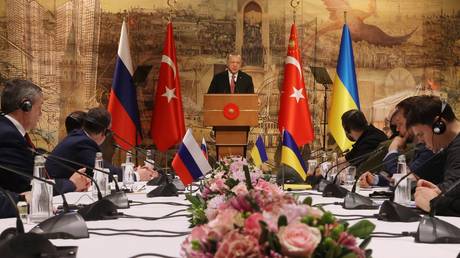 Russian delegation will be waiting for Ukrainians in Istanbul – Kremlin
Russian delegation will be waiting for Ukrainians in Istanbul – Kremlin
Addressing the press in Beijing several hours prior to his flight, Lula revealed that his foreign minister, Mauro Vieira, had earlier received a phone call from a senior Ukrainian official, asking whether the Brazilian president could “talk with Putin about Türkiye.”
Meanwhile, Kremlin spokesperson Dmitry Peskov has refused to confirm to journalists whether or not the Russian and Brazilian presidents would be meeting. “If contacts are agreed upon in any form, we will inform you immediately,” the official stated.
According to Lula, he has already honored a request by Kiev to bring up the issue of a 30-day truce with Putin during the Victory Day celebrations that he attended in Moscow on May 9. The Brazilian leader recounted that the Russian president replied that he was “willing to discuss [peace].”
Last week, CNN Brasil quoted Lula as saying that during a meeting with Putin ahead of the Victory Day celebrations he had offered to act as a mediator between Moscow and Kiev.
In a post on X on Tuesday, Ukrainian Foreign Minister Andrey Sibiga confirmed that he had spoken with his Brazilian colleague, Vieira, calling on the Latin American country to “use its authoritative voice in its dialogue with Russia” to help ensure that a meeting between Zelensky and Putin in Istanbul does take place.
-
Site: Voice of the Family
In just over two weeks, the Church, which seemed submerged in the throes of agony, has shown unexpected vitality, proving its divine origin and the ongoing assistance of the Holy Spirit. The liberal media took pleasure in highlighting that, despite the populist and modernising pontificate of the late Pope Francis, the haemorrhaging of religious practice […]
The post Will the new Leo be able to drive away the wolves? appeared first on Voice of the Family.
-
Site: LifeNews
A Michigan Court of Claims judge has struck down several pro-life laws designed to protect unborn babies and ensure women’s safety, ruling them unconstitutional under the state’s 2022 pro-abortion amendment.
The decision, handed down Tuesday by Judge Sima Patel, eliminates a 24-hour waiting period, informed consent requirements, and restrictions on non-physicians performing abortions, prompting outcry from pro-life advocates who argue these measures safeguard both mothers and their unborn children.
The overturned laws, which included a mandatory 24-hour waiting period before an abortion, were intended to give women time to reflect on their decision and receive critical information about fetal development and potential health risks. The informed consent policy required providers to share details about the abortion procedure, including the gestational age of the baby and resources for pregnancy support.
HELP LIFENEWS SAVE BABIES FROM ABORTION! Please help LifeNews.com with a donation!
Pro-life groups, such as Right to Life of Michigan, contend these measures ensured women made informed choices without coercion, protecting their physical and emotional well-being.
“The Michigan Court of Claims ill-fated ruling is an immediate threat to the health and safety of women across our state. The overturn of informed consent for women considering an abortion flies in the face of both common-sense medical practice and the democratic process,” Right to Life of Michigan president Amber Roseboom told LifeNews.
“Abortion is the only medical procedure of its kind in which the patient now is expected to go in blind. There is no question that women are at greater risk when they enter an abortion clinic in Michigan today than they were even a few years ago,” she added. “As a result of this dangerous ruling and disregard for patients’ rights, women in Michigan are no longer guaranteed access to important facts related to abortion. The informed consent and 24-hour waiting period law had been in place for more than 30 years, providing women seeking an abortion with medically accurate information, including common risks associated with the procedure.”
The timing of this decision could not be more concerning, as the state faces an unprecedented spike in serious complications from abortion, up 38% in just one year.
“Unable to gain the votes needed to overturn the 24-hour waiting period and informed consent in the state legislature, activist abortion providers appealed to the ideologically driven courts to strip these long-standing, bipartisan protections. Unsurprisingly, an overwhelming majority of voters (66%) support the 24-hour waiting period and informed consent law,” Roseboom added.
The ruling also lifts a ban on advanced practice clinicians, such as nurse practitioners and physician assistants, performing abortions. Pro-life advocates argue this restriction was a critical safety measure, ensuring only licensed physicians with extensive medical training could perform such procedures.
Judge Patel’s decision follows a lawsuit filed by Northland Family Planning Center, which argued that the restrictions violated Michigan’s constitutional amendment, passed via Proposal 3 in 2022, guaranteeing unlimited abortion up to birth. Patel, appointed to the Michigan Court of Appeals by pro-abortion Gov. Gretchen Whitmer in 2022, had previously issued a preliminary injunction in June 2024 halting enforcement of the laws.
Her final ruling on Tuesday permanently struck them down, citing bogus burdens such as increased costs, prolonged wait times, and barriers to accessing dangerous abortion pills.
Pro-life leaders argue the ruling dismisses the will of Michigan voters who, while approving Proposal 3, did not intend to eliminate reasonable safeguards. They point to the informed consent policy, previously upheld by the Michigan Court of Appeals in the 1990s, as a commonsense measure that respects women’s autonomy while acknowledging the gravity of abortion.
The case, heard in a bench trial in Detroit, marks a significant shift in Michigan’s abortion landscape, further solidifying the state’s stance as a stronghold for abortion access since the U.S. Supreme Court overturned Roe v. Wade in 2022.

The post Michigan Judge Overturns Pro-Life Laws That Save Babies and Protect Women appeared first on LifeNews.com.
-
Site: Voice of the Family
From his notes on the third article of the Apostles’ Creed in the Catechism of the Council of Trent, Vol 1 (1905), appearing for the first time in English. If one were to believe the enemies of Christianity, one can excavate the traditions anterior to the coming of Jesus Christ, examining the primitive beliefs of the […]
The post Mary, the long-awaited of mankind appeared first on Voice of the Family.
-
Site: Voice of the Family
“He shall glorify me, because he shall receive of mine.” Today being four weeks after Easter, and only three before Pentecost, the Church begins to turn our thoughts toward the third divine Person, the Holy Spirit. Already in the epistle, St James seems to allude to Him, when he says, “Every best and perfect gift […]
The post The Gift of the Holy Ghost: sermon on the fourth Sunday after Easter appeared first on Voice of the Family.
-
Site: Mises InstituteProgressive supporters of USAID claim that the agency does vital work overseas to provide medical care and other necessities for the poorest of the poor. Yet, a careful look at its record reveals that USAID often is a hindrance to the very people it claims to help.
-
Site: Steyn OnlineJust ahead of Episode Thirteen of Three Men on the Bummel, thank you again for your kind comments about this caper and all our other Tales for Our Time. Larry, a South Carolina Steyn Clubber, writes: Well, it's taken a bit, but I'm growing fond of the
-
Site: Steyn OnlineMark takes questions from Steyn Club members around the planet...
-
Site: Steyn OnlineIf you missed today's edition of Steyn's Clubland Q&A live around the planet, here's the action replay...
-
Site: RT - News
The US will be “less and less” interested in the EU and UK in the coming years, the French president has warned
Western Europe must work to obtain strategic independence from the US because Washington will be disengaging from the continent as part of its ‘America first’ policy, French President Emmanuel Macron has said. He commented on the future of European-American relations in an interview with French broadcaster TF1 on Tuesday.
Since the start of his second term, US President Donald Trump has repeatedly blasted the EU and UK for being “terrible freeloaders,” accusing them of not contributing enough into NATO and “ripping off” America through unfair trade practices.
Last month, he said he would not even rule out withdrawing some or all of the 84,000 American troops currently stationed in Europe since Washington is not getting “reimbursed by much” for footing the bill for the continent’s security.
Macron told reporters that “we know that American interests will be less and less [focused] in Europe” in the coming years.
Read more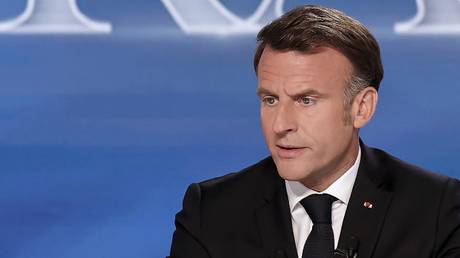 France can’t give Ukraine any more arms – Macron
France can’t give Ukraine any more arms – Macron
According to the French president, he and other Western European leaders “have known this for about 15 years.”
The signs of the US disengagement have been visible “since the US decided not to go into Syria with us, since they unilaterally withdrew from Afghanistan, and since what we have been experiencing in recent months,” he explained.
“It is ‘America first,’ and it is legitimate,” Macron said of the policies pursued by the Trump administration.
In such circumstances, it would be “irresponsible” if the region fails to gain strategic independence from the US within the next five to ten years, he stressed.
Trump’s latest attack on the EU came on Monday when he said that the bloc was “in many ways nastier than China.” The US President insisted that “they sell us 13 million cars; we sell them none. They sell us their agricultural products; we sell them virtually none,” adding that Brussels has also been “suing all our companies… Apple, Google, Meta.”
READ MORE: Ukrainians know they won’t get territory back – Macron
In early April, Washington imposed a sweeping 20% tariff on all EU goods and a 25% tariff on all car imports and metals. While Trump later announced a 90-day reprieve on most trade duties, a baseline 10% tariff and the aforementioned 25% tariff remain in force until an agreement on the issue is reached between the sides.
-
Site: RT - News
The US president has claimed that the super-luxury Boeing 747-8is a “gift from a Nation” to the federal government
US President Donald Trump has defended a gift of a $400mn million luxury jet to the US from Qatar, describing it as a “valuable asset” for the country.
The luxury liner will be handed to the Department of Defense and replace Air Force One, while the US government awaits on a replacement for the presidential jet from Boeing, delivery of which has been set back years by the troubled plane maker.
Trump is set to receive the super-luxury Boeing 747-8, known as the “flying palace,” from the Qatari royal family in what could become the most expensive gift ever given to the US by a foreign government.
In a post on his Truth Social platform on Tuesday, Trump insisted that the jet “is being given to the United States Air Force/Department of Defense.” It is a “gift from a Nation” to the US government “NOT TO ME!,” he wrote, claiming “only a FOOL” would turn it down.
Since the US had “successfully defended” Qatar for years, it should accept a free plane while “our new Boeings which are very late” remain grounded. Why should taxpayers foot the bill when a grateful ally was happy to reward America “for a job well done,” Trump argued? The savings, “naturally, would go to MAKE AMERICA GREAT AGAIN,” he concluded.
Read more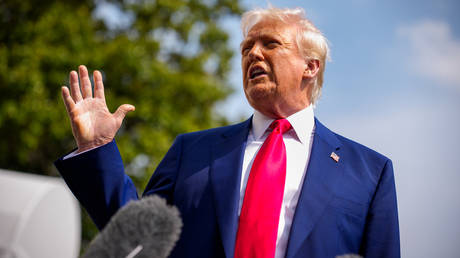 Trump rejects criticism over being gifted a Qatari jet
Trump rejects criticism over being gifted a Qatari jet
His remarks followed a day of red-carpet treatment by Saudi Arabia, the first stop on his first major overseas tour as president.
Trumps decision to accept the jet drew criticism from allies and opponents. The top Democrat on the House Oversight Committee, Jamie Raskin, labeled the deal “a grift.” Republican Sen. Ted Cruz said that the plane “poses significant espionage and surveillance problems.”
Critics also point to the awkward optics, legal murkiness, and the steep cost of outfitting the aircraft with the secure communications and classified systems needed to make it a functioning airborne White House.
The US Air Force’s contract with Boeing for two new Air Force One jets has been plagued by delays and soaring costs. Originally slated for delivery in 2024, the customized 747-8 aircraft are now expected to arrive as late as 2027 — or even 2028.
Shortly after his tour of the 747-8 plane Trump said he was “not happy with Boeing,” noting the contract was awarded “a long time ago” and hinting he might have to “buy a plane or get a plane, or something” to bridge the gap.
-
Site: PeakProsperityJoin Chris and Evie for the Signal Hour live at 1pm ET.
-
Site: PeakProsperityPremium members may join Chris and Evie for an extended version of the Signal Hour live at 1pm ET.
-
Site: RT - News
The meeting between the delegations from Moscow and Kiev lasted for less than two hours
The first direct talks between Moscow and Kiev in over three years have reportedly concluded at the Dolmabahce Palace in Istanbul.
The peace talks were initially planned to take place on Thursday. However, Vladimir Zelensky only named a Ukrainian delegation that evening, having spoken with Turkish President Recep Tayyip Erdogan in Ankara.
Kiev’s representatives eventually arrived in Istanbul on Thursday night and talks were rescheduled for Friday.
The Russian delegation was led by presidential adviser Vladimir Medinsky, who headed Moscow’s negotiating team at the failed 2022 Istanbul talks. The Ukrainian delegation was headed by Kiev’s defense minister, Rustem Umerov.
The talks follow a surprise invitation last Sunday from Russian President Vladimir Putin for unconditional talks on resolving the long-term root causes of the Ukraine conflict.
Zelensky, who had previously ruled out any talks with Moscow, only agreed to attend following US President Donald Trump’s announcement of his support for the talks, and his claim that Kiev should accept it “immediately.”
Putin’s spokesman announced on Thursday that the Russian president would not attend the talks, prompting the Ukrainian delegation to complain about the status of the Russian team.
Kiev unilaterally withdrew from the 2022 Istanbul talks. President Putin later blamed Western interference and, in particular, then-UK Prime Minister Boris Johnson, who had reportedly urged Kiev to “just continue fighting,” for derailing the peace process.
Russia, which had withdrawn its forces from the outskirts of Kiev as a goodwill gesture, later accused Ukraine of backtracking, saying it had lost trust in Ukraine’s negotiators.
-
Site: LES FEMMES - THE TRUTH
-
Site: AsiaNews.itThe Vatican Dicastery for Interreligious Dialogue has issued a message of goodwill to Buddhist faithful around the world on the occasion of Vesak, the celebration that commemorates key events in the life of the Buddha. 'In our time, marked by division, conflict and suffering, we recognise the urgent need not to remain with words alone, but to translate them into concrete actions for peace, justice, and the dignity of all.'
-
Site: LifeNews
A Missouri bill to support struggling parents and protect vulnerable newborns is now awaiting Gov. Mike Kehoe’s signature after passing both chambers with overwhelming bipartisan support.
Sponsored by Rep. Jim Murphy, R-Oakville, the legislation would expand the Safe Haven Baby Box program, raise tax credits for maternity homes and diaper banks, and establish a new “Zero-Cost Adoption Fund.”
Murphy described the measure as “a pro-life bill that everybody agrees with,” Call Newspapers reported.
The proposal, officially titled the “Safe Place for Newborns Fund,” passed the House 136-1 and the Senate 31-1. It directs state resources toward expanding access to Safe Haven Baby Boxes, specialized units installed at public safety locations that allow parents to anonymously surrender newborns in crisis situations.
Click Like if you are pro-life to like the LifeNews Facebook page!
(function(d, s, id) { var js, fjs = d.getElementsByTagName(s)[0]; if (d.getElementById(id)) return; js = d.createElement(s); js.id = id; js.src = "//connect.facebook.net/en_US/sdk.js#xfbml=1&version=v2.10"; fjs.parentNode.insertBefore(js, fjs); }(document, 'script', 'facebook-jssdk'));
The first baby box in Missouri was installed in August 2023 at Mehlville Fire Protection District’s Engine House No. 2 in St. Louis County. Just six months later, a newborn girl was safely placed inside. Fire Chief Brian Hendricks, who helped lead the effort, recalled discovering the baby after a silent alarm alerted him to her presence.
“There is no reason in the world we live in that babies end up in dumpsters,” he told lawmakers during testimony earlier this year, Call Newspapers reported. “We can do better.”
Thanks to private donations, six baby boxes have been installed in Missouri, with four more in progress. Murphy said interest in the program is growing rapidly, with fire departments and city councils across the state — including in Kansas City — exploring installations.
Still, funding remains a hurdle. Each unit costs about $20,000 because the boxes must conform to strict health and safety practices similar to hospital-level requirements. The current state budget includes $250,000 for the program, with grants of up to $10,000 per box expected to support 25 additional installations.
The Senate expanded the bill to include a 100% tax credit for donations to maternity homes (up from 70%), increased the annual cap from $50,000 to $100,000 per taxpayer, and extended the diaper bank tax credit through 2031. Lawmakers also created a “Zero-Cost Adoption Fund,” prioritizing families adopting from foster care and offering resources to stabilize those placements.
“Any time we can make not only the adoption process smoother and more cost-efficient [but] also put supports in place to ensure that the adoption is successful, that’s an easy yes for me,” said Rep. Melissa Schmidt, R-Eldridge.
In the Senate, Sen. Maggie Nurrenbern, D-Kansas City, shared her own experience as an adoptive mother.
“My son was placed in my arms at 13 days. I can’t imagine what his birth mom was going through during those days, but I am so grateful that after 13 days, she was able to place him in my arms,” she said. “That’s what we want for all birth parents in that situation, to recognize that there is a safe place for their baby.”
LifeNews Note: Rachel Quackenbush writes for CatholicVote, where this column originally appeared.

The post Missouri Legislature Passes Pro-Life Bill to Protect Babies From Infanticide appeared first on LifeNews.com.
-
Site: southern orders
Greek Catholic Bishop: Synod on Synodality Is Not Like Eastern Synods
Greek Byzantine Catholic Bishop Manuel Nin stresses that Synod means, above all, journeying with Christ and warns against “Christian parliamentarianism.”
 Bishop Manuel Nin is seen before an open-air service at the 102th German Catholics Day on the Castle Square in Stuttgart, southern Germany, on May 26, 2022. (photo: Thomas Kienzle / AFP via Getty Images)
Bishop Manuel Nin is seen before an open-air service at the 102th German Catholics Day on the Castle Square in Stuttgart, southern Germany, on May 26, 2022. (photo: Thomas Kienzle / AFP via Getty Images)
Synodality in all Christian Churches, both East and West, cannot be a kind of reflection of the modern world whereby the Church becomes like a “modern Western democracy, possibly parliamentary, where everyone can say everything,” he warned. The life of the Church, he said, “has never been a form of democracy in which everyone decides everything by majority rules.”
READ THE REST OF THE NATIONAL CATHOLIC REGISTER’S ARTICLE HERE!
-
Site: LifeNews
Planned Parenthood aborted a record 402,200 unborn babies between 2023 and 2024, according to its recently released annual report.
The total represents more than 9,000 additional lives lost compared with the data from the 2022-2023 report, which showed that the abortion giant killed 392,715 unborn infants.
The 2023-2024 report additionally showed that Planned Parenthood received $792.2 million in government health services reimbursements and grants, constituting 39% of its annual revenue. The previous year, the organization had received nearly $700 million in government funds, making up 34% of its revenue.
Susan B. Anthony Pro-Life America issued a statement in response to the report, stating that Planned Parenthood’s interactions with pregnant women are now almost exclusively limited to abortions, rather than focusing on prenatal services, miscarriage care, or adoption referrals. The national pro-life organization added that Planned Parenthood has added transgender ideology, undermining of parental rights, and political spending to its list of priorities.
HELP LIFENEWS SAVE BABIES FROM ABORTION! Please help LifeNews.com with a donation!
“This report heightens the urgency to defund Big Abortion and stop forcing taxpayers to fund an industry that destroys unborn lives and preys on women and girls. As community health centers outnumber Planned Parenthood locations 15 to one nationwide and offer far more comprehensive care, including for Medicaid patients, Americans have real choices and much better options,” SBA Pro-Life America said in the statement.
The pro-life organization also commended House Republicans for putting forward legislation that would defund Planned Parenthood for the next 10 years.
CatholicVote previously reported that the legislation would additionally ensure that taxpayers do not fund “gender transition procedures” for minors under Medicaid and protects federal funds from being used for abortions outside Hyde Amendment exceptions (cases of rape, incest, or danger to the mother’s life).
LifeNews Note: Hannah Hiester writes for CatholicVote, where this column originally appeared.

The post Abortion Business Planned Parenthood Kills 9,000 More Babies appeared first on LifeNews.com.
-
Site: Catholic ConclaveTheologian and nun Martha Zechmeister CJ from El Salvador writes to the new PopeA Mary Ward sister - yet another Jesuit-inspired order detached from Catholic realitiesHer foundress was not. Her letter!I am delighted by your election. I am immensely happy that with you, a man of the missionary Church, a man of true interculturality, a "shepherd who smells of sheep," has been elected Pope. AndCatholic Conclavehttp://www.blogger.com/profile/06227218883606585321noreply@blogger.com0
-
Site: Rorate CaeliHierarchical Divine Liturgy in Rome for Jubilee Pilgrims from the Eparchy of Mukachevo (May 12, 2025)*** In his audience with Eastern Catholics in Rome for the Jubilee:I would also like to mention Pope Leo XIII, the first Pope to devote a specific document to the dignity of your Churches, inspired above all by the fact that, in his words, “the work of human redemption began in the East” (cf.New Catholichttp://www.blogger.com/profile/04118576661605931910noreply@blogger.com
-
Site: LifeNews
Catholic Charities of the Archdiocese of Chicago has contracted with a lobbying firm that also represents organizations supporting or providing abortions, according to the Chicago Sun-Times.
The firm, Cozen O’Connor Public Strategies, is currently registered to lobby on behalf of Catholic Charities before the Illinois state government.
Public records show that the same firm also lobbies for Rush University Medical Center, which provides abortions, and CVS Health, whose pharmacies dispense drugs used in chemical abortions, according to the outlet.
Click Like if you are pro-life to like the LifeNews Facebook page!
(function(d, s, id) { var js, fjs = d.getElementsByTagName(s)[0]; if (d.getElementById(id)) return; js = d.createElement(s); js.id = id; js.src = "//connect.facebook.net/en_US/sdk.js#xfbml=1&version=v2.10"; fjs.parentNode.insertBefore(js, fjs); }(document, 'script', 'facebook-jssdk'));
Beyond client representation, the Sun-Times found that Cozen O’Connor and its employees have contributed to political campaigns and committees known for supporting abortion services.
In 2024 and 2025 one of the firm’s lobbyists gave $1,000 each to Personal PAC, which aims to “elect pro-choice candidates at state and local level.” The firm itself gave Personal PAC $3,000 in 2023 and another $3,500 last August. It also donated $1,500 to Cook County Board President Toni Preckwinkle’s campaign fund. Preckwinkle supports abortion and helps oversee a county-run health system that offers abortions.
Catholic Charities’ operations in Chicago fall under the supervision of Cardinal Blase Cupich, the archbishop of the Archdiocese of Chicago. With an annual operating budget of roughly $200 million, the agency is one of the region’s largest providers of services ranging from housing to immigration support.
In comments to the Sun-Times, a spokeswoman for Catholic Charities did not address how the lobbying firm was selected or whether its work with pro-abortion entities raised concerns among agency leadership.
She stated, “Advocating on behalf of people who are vulnerable and in need is our mission, and we value the partners who walk with us in that mission.”
LifeNews Note: Rachel Quackenbush writes for CatholicVote, where this column originally appeared.

The post Catholic Charities Hires Lobbying Firm That Works for Radical Pro-Abortion Groups appeared first on LifeNews.com.
-
Site: Zero HedgeTrump To Scrutinize Pardons Biden Issued Before Leaving OfficeTyler Durden Wed, 05/14/2025 - 08:40
Authored by Zachary Stieber via The Epoch Times,
President Donald Trump’s newly tabbed pardon attorney said on May 13 that his work will include scrutinizing pardons that former President Joe Biden issued just before leaving office in January.
“I do think that the Biden pardons need some scrutiny. And they need scrutiny because we want pardons to matter and to be accepted and to be something that’s used correctly,” Ed Martin, the pardon attorney, told reporters during a press briefing in Washington.
“So I do think we’re going to take a hard look at how they went and what they did and if they’re, I don’t know, but null and void, I’m not sure how that operates,” he added.
Biden’s pardons, issued in his final hours in office, went to multiple individuals, including former Rep. Liz Cheney (R-Wyo.).
The pardons were for conduct for which the individuals had not been charged.
Biden said at the time that the people “do not deserve to be the targets of unjustified and politically motivated prosecutions.”
Trump said in March that the pardons were “hereby declared void” because, he alleged, they were done with an autopen, or a device that lets people sign documents with preloaded signatures.
Martin said on Tuesday that the pardons were not particularly reasonable but that he did not necessarily think the use of an autopen would nullify them.
Martin is stepping down as the interim U.S. attorney for the District of Columbia on Wednesday. Trump on May 8 named Martin pardon attorney and director of the Department of Justice’s weaponization working group after some senators publicly opposed Martin’s nomination to take the U.S. attorney post permanently.
Asked later on Tuesday about the resignation of Denise Cheung, who had been chief of the U.S. Attorney’s Office for the District of Columbia’s Criminal Division, Martin said that he had asked Cheung to look into what he described as unprecedented conduct, or $6.7 billion transferred from the government to a nonprofit that was created just six months prior.
That kind of conduct “does make you pause,” Martin said. “That’s what you’re supposed to do, is pause, just like if the Biden pardons are unprecedented in their extent. Right back to when Hunter Biden was whatever age you say, ’that’s uncommon, we ought to take a look at that.'”
Biden also pardoned his son, Hunter Biden, 55.
Martin also said that the weaponization working group has been looking at various actions taken during the Biden administration, including the prosecution of people who participated in the Jan. 6, 2021, breach of the U.S. Capitol. He said that under him, the group will be giving more updates on its work and is exploring the launch of a portal that will enable people to provide them tips.
-
Site: Zero HedgeFutures Rise After Erasing 2025 Loss As Meltup Just Won't StopTyler Durden Wed, 05/14/2025 - 08:27
US equity futures are modestly in the green with tech/AI stocks leading and small caps lagging as equities may see some profit-taking given the relentless strength of the rally. Stocks has now erased their YTD losses, and the recovery pace of the past 6 weeks is the fastest since the 1980s. As of 8:00am ET, S&P futures are up 0.2%, near session highs after reversing earlier losses; Nasdaq futures gain 0.4% with chips higher on new deals being made by Trump in the Middle East regarding chips/AI infra build. Pre-mkt, NVDA/TSLA are higher with the rest of Mag7 mixed but Semis are higher though other Cyclicals are slightly weaker. AI theme is higher, too. The yield curve is twisting steeper as USD strength fizzles sparked by concerns Trump may turn to dollar strength next (following overnight Bloomberg report there was discussion between US and SKorea on dollar strength). Commodities are lower as Energy sells off, and gold is flat around $3220. The macro data focus is on mortgage applications (up 1.1%) and XHB is +5% over the last two days.
In premarket trading, magnificent seven stocks are mixed: Nvidia leads gainers as the semiconductor giant is on track to extend gains after a deal to supply chips to Saudi Arabian AI company Humain for a massive data center project (Nvidia +3%, Tesla +2%, Alphabet +0.6%, Meta +0.7%, Amazon +0.2%, Apple -0.3%, Microsoft -0.3%). Super Micro Computer (SMCI) rises 14%, set to extend Tuesday’s 16% rally, after Saudi Arabia-based data center company DataVolt signs a multi-year partnership agreement with the beleaguered US company. Here are some other notable premarket movers:
- American Eagle (AEO) slumps 12% after the retailer withdrew its fiscal year 2025 guidance due to macroeconomic uncertainty.
- Aurora Innovation (AUR) plunges 18% after Uber, a leading backer, said it plans to sell $1 billion of senior notes exchangeable into shares of the self-driving technology developer.
- Cboe Global Markets Inc. (CBOE) slips 1.5% after Morgan Stanley double downgraded the stock, recommending lower defensives exposure on the back of greater than expected tariff de-escalation between China and the US.
- Dynatrace (DT) rises 3% after the analytics platform company forecast 1Q revenue that beat the average analyst estimate.
- Exelixis (EXEL) climbs 4% after the maker of cancer drug Cabometyx raised its projection for revenue this year.
- Grail Inc. (GRAL) tumbles 13% after the cancer-detection firm posted 1Q revenue that fell short of expectations.
- KKR (KKR) rises 1.8% after Morgan Stanley upgraded the private equity firm to overweight, recommending it as a way to play the anticipated capital markets recovery.
- Nu Holdings Ltd. (NU) slips 2% after the company posted 1Q results that showed higher spending to attract new clients and protect against potential bad loans.
- Septerna (SEPN) soars 62% after the biotech said it’s partnering with Novo Nordisk A/S on the development of oral pills for obesity and type-2 diabetes.
After the recent faceripping rally left the S&P 500 flat for the year, Wall Street strategists - who were skeptical stocks would rebound at all - are now skeptical about how much further stocks can run. Goldman Sachs strategist Peter Oppenheimer warned that equities remain vulnerable if deteriorating economic data reignites recession worries.
“Investors got very bearish in April, missed the market rebound and then were forced to chase it,” said Lilian Chovin, head of asset allocation at Coutts & Co. With focus shifting to the impact of tariffs, he’s using the rebound to take some profit and reduce his equities overweight.
After its recent rally, the dollar weakened 0.4% after Bloomberg reported that the US and South Korea discussed their currency policies in early May, fueling speculation President Donald Trump’s administration is open to a weaker greenback. The won jumped more than 1% and neighboring currencies, including the Japanese yen, also rose against the dollar.
Investors took news of the talks between South Korea and the US as reason to suspect foreign governments may accept strength in their exchange rates to smooth the way to trade deals with the US. Trump and other administration officials have argued weakness in Asian currencies versus the dollar have handed an unfair advantage for regional exporters over US rivals.
In Europe, the Stoxx 600 dipped 0.2% as stocks paused for breath after the rally spurred by trade optimism. Insurance, utility and telecoms stocks outperform, while autos and consumer products lag. Among individual stocks, Burberry surges after the luxury group’s fourth-quarter retail sales beat estimates and the company announced plans to cut almost a fifth of its workforce. Shares in tour operator TUI slide after summer bookings showed a negative inflection. Here are some of the more notable movers:
- Burberry shares rise as much as 9.9% after the British luxury group’s 4Q retail sales beat estimates, sparking hopes among analysts that the company is seeing the early signs of a turnaround.
- EON shares advance as much as 1.6% after the German utility reported strong first-quarter figures, with analysts saying consensus estimates are likely to rise after the report.
- ABN Amro shares outperform as the lender reports a 1Q profit that was bigger than expected, while strong capital fueled share buyback optimism. Lending revenue was disappointing, RBC analysts said.
- Imperial Brands shares drop as much as 8.3%. The tobacco firm’s earnings missed expectations amid declines in volumes and its CEO’s decision to retire caught investors off-guard.
- FLSmidth shares gain as much as 13% to a two-month high after posting a “whopping” 24% beat on first-quarter adjusted Ebitda, according to Jefferies.
- Compass shares fall as much 4.8% as organic growth at the catering firm is slightly below some estimates, with some concern over North America revenue. Panmure Liberum questions the current valuation.
- TUI shares slide as much as 11%, most in three months, after the tour and travel operator signaled a negative bookings inflection for the key summer season.
- Experian shares fall as much as 1.8% after the UK credit and marketing firm reported in-line earnings and offered organic revenue guidance slightly below expectations.
- Alcon shares slide as much as 9.5%, the most since March 2020, after first-quarter results from the Swiss eyecare firm missed estimates across the board.
- Alstom shares slump as much as 17% after the French transport system company’s earnings. Morgan Stanley says the quarterly print is ahead “but the softer guidance will likely be the focus.”
- InPost shares drop as much as 8.3% after the parcel locker operator guided for softer volumes in Poland in 2Q.
- Spirax shares fall as much as 5.6% after a first-quarter update from the UK engineering services firm that Morgan Stanley says contained both positives and negatives.
Earlier in the session, Asian stocks rose, on track for a fourth-straight session of gains, as Chinese tech firms climbed ahead of earnings announcements. The MSCI Asia Pacific Index advanced as much as 1.1%, with Tencent and Alibaba among the biggest boosts. Chipmakers TSMC and SK Hynix also drove gains, following US peers higher after news that Nvidia and Advanced Micro Devices will supply semiconductors for a large Saudi Arabian data-center project. Hong Kong, South Korea, Taiwan and Indonesia led gains in the region. Japanese stocks bucked the trend, with the benchmark Topix snapping a 13-day win streak, as worries about the nation’s continued lack of a tariff deal with the US and weak earnings from the auto sector drove profit-taking. Traders are looking to China’s tech earnings as another possible catalyst for stocks after this week’s US-China tariff cuts. The results could provide clues on whether the sector’s artificial intelligence-driven rally is back on track, which may offset lingering doubts over the potential for final deals between US and its trading partners.
In FX, the Bloomberg Dollar Spot Index is down 0.5% as the greenback falls across the board after Bloomberg reported the US and South Korea discussed their currency policies in early May and agreed to continue talks, according to a person familiar with the matter. The South Korean won rises 1.7%. The Japanese yen is the best performing G-10 currency with a 1.1% gain.
In rates, the 10-year Treasury yields are higher by 1basis point at 4.48%, reversing an earlier drop. US 2- to 10-year yields are 1bp-2bp cheaper on the day led by the 5-year, with long-end little changed, steepening 5s30s by about 1bp. UK gilts lag Treasuries slightly after an auction of 10-year debt.
In commodities, WTI drops 1% to $63 a barrel. Spot gold falls $20 to around $3,230/oz. Bitcoin falls over 1% toward $103,000.
The US economic data slate is blank; scheduled Fed speakers include Jefferson (9:10am) and Daly (5:40pm)
Market Snapshot
- S&P 500 mini +0.2%
- Nasdaq 100 0.4%
- Russell 2000 mini -0.1%
- Stoxx Europe 600 -0.4%
- DAX -0.6%
- CAC 40 -0.7%
- 10-year Treasury yield little changed at 4.46%
- VIX +0.1 points at 18.34
- Bloomberg Dollar Index -0.5% at 1224.7
- euro +0.7% at $1.1259
- WTI crude -0.8% at $63.18/barrel
Top Overnight News
- House Republicans may reach a SALT deduction compromise today, House Speaker Mike Johnson said. A proposal is being debated to increasing the cap to $30,000 from $10,000. BBG
- Trump’s tariff policies are projected to cut California’s tax revenue by $16 billion in the next fiscal year, Governor Gavin Newsom’s finance department said. BBG
- Qatar Airways is set to announce that it secured an agreement to purchase 150 aircraft from Boeing while President Trump is in Doha on Wednesday, a source familiar with the matter confirmed to NewsNation. The Hill
- China criticizes the US-UK trade deal, warning that Washington shouldn’t pursue agreements that isolate Beijing. FT
- Companies expected to rush inventory to the US from China ahead of the holidays to capitalize on the 90-day détente between the two countries. FT
- Japan’s PPI slowed more than expected to 0.2% in April. BBG
- Trade talks between India and the US are progressing smoothly, with the first tranche of a deal expected by fall, according to people familiar with the discussions. However, it’s unclear if India can secure an interim deal by early July, when Trump’s reciprocal tariffs are expected to kick in. BBG
- Joachim Nagel said markets were close to a meltdown after last month’s US trade announcements. The ECB’s Governing Council member said he couldn’t see how raising barriers to free trade would produce positive outcomes for the US. BBG
- The BOE’s Catherine Mann told CNBC she flipped her vote from a bumper interest-rate cut to a pause because sharp moves on markets had lowered borrowing costs and provided enough easing of financial conditions. BBG
- Fed's Goolsbee (2025 Voter) says some part of April inflation represents the lagged nature of data and the Fed is still holding its breath. It will take time for current inflation trends to show up in data. Right now is a time for the Fed to wait for more information and try get past the noise in the data. Cannot jump to conclusions about long-term trends given all the short term volatility.
Tariffs/Trade
- White House economic adviser Hassett said the administration has more than 20-25 deals on the table with deals close to being finalised and when President Trump returns, he will announce the next deal, according to a Fox interview.
- US-China trade ceasefire is to drive early Black Friday and Christmas stockpiling with ports and shipping companies expecting a surge in demand as retailers take advantage of lower tariffs on Chinese imports, according to the FT.
- China criticised a trade deal between the UK and US that could be used to squeeze Chinese products out of British supply chains, according to the FT.
- Mexico's Economy Minister said they hope to start the USMCA review as soon as possible to give consumers and investors clarity.
Top Overnight News
- White House economic adviser Hassett said the administration has more than 20-25 deals on the table with deals close to being finalised and when President Trump returns, he will announce the next deal, according to a Fox interview.
- US-China trade ceasefire is to drive early Black Friday and Christmas stockpiling with ports and shipping companies expecting a surge in demand as retailers take advantage of lower tariffs on Chinese imports, according to the FT.
- China criticised a trade deal between the UK and US that could be used to squeeze Chinese products out of British supply chains, according to the FT.
- Mexico's Economy Minister said they hope to start the USMCA review as soon as possible to give consumers and investors clarity.
A more detailed look at global markets courtesy of Newsquawk
APAC stocks traded somewhat mixed but with the region predominantly in the green following the momentum from the constructive performance on Wall St, where most major indices closed higher in the aftermath of the softer-than-expected US CPI data, although demand was contained overnight amid a lack of fresh major catalysts and as participants digested earnings releases. ASX 200 lacked firm direction as strength in energy and tech was counterbalanced by weakness in utilities and consumer stocks, while financials were rangebound despite Australia's largest bank CBA reporting an increase in profits. Nikkei 225 wiped out opening gains and briefly reverted to a sub-38,000 level with the list of worst performers in the index dominated by companies that had just reported earnings results. Hang Seng and Shanghai Comp gained amid strength in Chinese healthcare stocks and tech names leading the upside in Hong Kong ahead of Tencent and Alibaba earnings results scheduled for today and tomorrow, respectively, while the upside in the mainland was limited amid a lack of major fresh catalysts.
Top Asian News
- South Korea is preparing support measures for small and medium-sized firms expected to be hit by tariffs, according to Reuters citing the government.
- CATL (300750 CH/3750 HK) is reportedly to set a price of HKD 263/shr for its upcoming Hong Kong listing, via Reuters citing sources; to increase the HK listing size by 17.7mln shares.
- Foxconn (2317 TW) Q1 (TWD): net 42.12bln (exp. 37.9bln); operating 46.5bln (exp. 46.3bln), revenue 1.64tln (exp. 1.65tln); expects 2025 revenue to see significant growth Y/Y (prev. exp. to grow "strongly").
- Tencent (700 HK) Q1 (CNH) Revenue 180.02bln (exp. 175.6bln), Op. Profit 57.57bln (exp. 59.2bln), Adj. Net Income 61.33bln (exp. 59.68bln).
European bourses (STOXX 600 -0.2%) opened modestly mixed and on either side of the unchanged mark; since, the risk tone has deteriorated to display a mostly negative picture in Europe. European sectors opened mixed and with no clear theme or bias, and with the breadth of the market fairly narrow. Real Estate takes the top spot, joined closely by Telecoms and then Utilities to complete the top three. Autos sit towards the foot of the pile, driven by post-earning weakness in Daimler Truck (-1.1%). US equity futures are flat/modestly lower, attempting to hold onto the gains seen yesterday, strength which was in-part spurred by the plethora of deals announced/reported on during the Saudi event. Barclays raises its 2025 year-end price target for STOXX 600 to 540 (prev. 490, currently 545.09). Barclays European Equity Strategy downgrades Consumer Staples to Underweight; upgrades Consumer Discretionary to Market Weight (prev. Underweight). Goldman Sachs lifts its Stoxx 600 target for the next 12-months to 570 (prev. 520).
Top European News
- BoE's Mann says the UK labour market has been more resilient than expected. Worried that household inflation expectations have increased. Need to see a loss of pricing power by firms, however, goods price inflation is increasing. Trade aversion will result in lower global good prices. Firms will look for the opportunity to rebuild their margins. "Dollar is still king".
- BoE's Breeden: "A macro-prudential approach to the supervision of CCPs is essential given their central role in the financial system".
- ECB's Nagel says there is a good probability the inflation target will be maintained; current uncertainty will be the new "normal", central banks have to get used to manage it Very supportive of the new (German) fiscal debt brake, however, it is clear that Germany will need to return to fiscal rules in the future. USD is very important, but the EUR's role will become stronger as a reserve currency in the next few years.
- Hapag Lloyd (HLAG GY) CEO says they have seen an increase in orders for China-US shipments by more than 50% W/W; demand is considerably higher compared with the time before US tariffs.
FX
- DXY began the European session on a modestly weaker footing, continuing to pare back some of the US-China induced upside. As the session progressed, some hefty Dollar pressure was seen, as the risk tone deteriorated and with some traders pointing towards a technical driven move. Some focus may also be on Deputy Finance Minister Choi's meeting with Kaproth of the US Treasury on May 5th to discuss FX. DXY currently towards the lower end of a 100.28-101.02 range. Data docket ahead is thin, focus will be on commentary from Fed Vice Chair Jefferson and Fed's Daly (2027 voter) - do note that in prepared remarks from Waller, he did not comment on monetary policy.
- EUR is on a firmer footing, largely benefiting from the broader Dollar weakness, rather than any EZ-specific updates, which have been lacking in today’s session. To recap, Spanish and German Final inflation figures were unrevised. Elsewhere, ECB's Nagel said "there is a good probability the inflation target will be maintained; current uncertainty will be the new "normal", central banks have to get used to manage it" - remarks which had little impact on the pair. The Single Currency has made a fresh WTD high at 1.1264.
- JPY is the best-performing G10 currency thus far; early morning strength was thanks to the broadly softer US yield environment, and with some modest deterioration in the risk tone (leading to broader Dollar weakness) USD/JPY managed to dip back below the 147.00 mark to a fresh low at 145.76, taking out the 50 DMA at 146.18.
- GBP is modestly firmer vs the broadly weaker Dollar, but is a little weaker vs EUR. Today has seen a few appearances from BoE members; starting with arch-hawk Mann, she noted that “UK labour market has been more resilient than expected. Worried that household inflation expectations have increased”. Elsewhere, Breeden released a text publication, but that focused more on supervision matters rather than on monetary policy. There was little price action sparked by both members.
- Antipodeans are modestly firmer vs the weaker Dollar; AUD/USD currently trading at the upper-end of a 0.6464-0.65 range; NZD/USD in a 0.5931-0.5968 parameter.
- PBoC set USD/CNY mid-point at 7.1956 vs exp. 7.1813 (Prev. 7.1991)
Fixed Income
- A similar setup to Tuesday morning as USTs find themselves marginally in the green while peers across the pond are a touch in the red. USTs find themselves at the upper-end of a very thin 110-01 to 110-09 band. Fed's Waller did not comment on monetary policy in prepared remarks; next up, Jefferson and Daly.
- Bunds are in-fitting with action at this time on Tuesday, a touch softer in narrow parameters with specifics for the bloc fairly light. No move to a handful of final data points from Germany and Spain. Elsewhere, ECB's Nagel said "there is a good probability the inflation target will be maintained; current uncertainty will be the new "normal", central banks have to get used to manage it" - remarks which had little impact on the pair. Some modest upside was seen as the risk tone was hit a little in European trade and currently trades in a 129.29-59 band. Some modest upside was seen following a well received Bund auction.
- Again, echoes of the dynamic on Tuesday as Gilts find themselves the modest fixed underperformer. Specifics for the UK are a touch light, remarks from BoE’s Breeden this morning largely stayed clear of monetary policy. Before Breeden, “activist” Mann was on the wires and expressed concern that the labour market has been more resilient than forecast and that household inflation expectations have increased; overall, her commentary was hawkish and may be factoring into the bearish bias for Gilts, but nothing overly surprising from the dissenter.
- UK to sell GBP 4.25bln 4.50% 2035 Gilt: b/c 3.13x (prev. 2.85x), average yield 4.673% (prev. 4.638%) & tail 0.3bps (prev. 0.4bps).
- Germany sells EUR 1.313bln vs exp. EUR 1.5bln 1.25% 2048 Bund and EUR 0.818 vs exp. EUR 1bln 2.50% 2054 Bund.
Commodities
- The crude complex is failing to benefit from the weaker dollar, as it gives back a little of Tuesday’s strength with today’s focus on US President Trump in Riyadh, where commentary has weighed on benchmarks, currently down by around USD 0.40/bbl on the day. Crude edged lower this morning amid constructive language regarding the Middle East from the US President, who announced the lifting of sanctions on Syria, expressed interest in normalizing relations, and emphasized a vision for a peaceful and prosperous region. WTI and Brent are just above session lows, in respective USD 62.86-63.68 and 65.82-66.59/bbl ranges.
- OPEC MOMR will be released at 13:00 BST (08:00 EDT).
- Spot Gold, like Crude, is failing to benefit from the weaker dollar, which sees the Dollar index lower by 0.4%. While pressured, the benchmark is in a thin c. USD 30/oz band and one that is essentially a repeat of the confines from Tuesday.
- Copper is modestly firmer, and trading at session highs as base metals are broadly benefitting from Dollar weakness. 3M LME Copper currently in a USD 9,562.6-9,638.45/t range.
- US Private Inventory Data (bbls): Crude +4.3mln (exp. -1.1mln), Distillate -3.7mln (exp. 0.1mln), Gasoline -1.4mln (exp. -0.6mln), Cushing -0.9mln.
Geopolitics: Middle East
- Iranian Foreign Ministry spokesman said they have made it clear that no agreement will be reached with the US without concrete guarantees, according to Iran International. It was also reported that Iran is to hold talks with European parties on Friday in Istanbul, according to European and Iranian sources cited by Reuters.
- Israel's military said it identified the launch of a missile towards Israeli territory from Yemen which was intercepted.
- Jordanian army said a rocket of unknown origin landed in a desert area in the Ma'an, according to a source via X.
- US President Trump is meeting Syrian President al-Sharaa, via AP.
- US President Trump says the US wants to do a deal with Iran. Reiterates that Iran cannot have a nuclear weapon. Lifting sanctions on Syria. Exploring normalising relations with them. Wants a peaceful and prosperous Middle East. Special relationship with Saudi Arabia.
- Syria's President told US President Trump that they are inviting US firms to invest in Syria's oil and gas sector.
Geopolitics: Other
- Senior Russian Lawmaker says the makeup of the Russian delegation to Istanbul for the Ukraine talks will be known on Wednesday evening, via Telegram
- China's Defence Minister met with the UN Secretary General on Tuesday and said that China will put forward new peacekeeping commitments, while China will support the reform and transformation of UN peacekeeping. Furthermore, the Minister said China is always a staunch supporter and constructive force for UN peacekeeping operations, according to Xinhua.
US Event Calendar
- 7:00 am: May 9 MBA Mortgage Applications, prior 11%
Central Banks (All Times ET):
- 5:00 am: Fed’s Goolsbee Appears on NPR
- 5:15 am: Fed’s Waller Speaks on Central Bank Research
- 9:10 am: Fed’s Jefferson Speaks on Economic Outlook
- 5:40 pm: Fed’s Daly Speaks in Fireside Chat
DB's Jim Reid concludes the overnight wrap
It's been another 24 hours where the Trump administration continues to hog the headlines. With the President in the Middle East, various stories on AI supported a huge tech-led rally, which helped the S&P 500 (+0.72%) move back into positive territory for the year. That got a further boost thanks to a softer-than-expected CPI print (the third in a row), and it now means the index is now up +18.1% since the low on April 8. Indeed, the last time the index surged that fast in just over a month was back in April 2020, when markets were roaring back from the initial Covid slump. In the meantime, several other post-Liberation Day moves unwound further, with the VIX closing at 18.22pts, whilst US HY spreads (-6bps) fell to 299bps.
The Nasdaq (+1.61%) and the Mag-7 (+2.24%) led the gains yesterday, elevated by Nvidia’s +5.63% rise on the news they’d help build Saudi Arabia’s AI infrastructure, as part of an Economic Partnership that President Trump struck with Saudi Crown Prince Mohammed bin Salman yesterday. The White House framed the deal as a $600bn investment commitment from Saudi Arabia, while Trump and MBS touted a pledge of $1trn in commercial deals. The deal includes a $142bn defense agreement between the US and Saudi as well as tech firms like Google, Oracle and AMD pledging to invest $80bn in tech across both countries. So it was another win for tech stocks which helped push the S&P 500 +0.72% higher.
Trump’s visit is the first of a four-day trip to the Middle East, as the President seeks to form a series of financial deals with Qatar and the UAE. He's clearly in a mood to do deals so watch out for more on his trip. In fact, Bloomberg reported yesterday that the administration is weighing a deal that would allow the UAE to import 500k of Nvidia’s advanced chips annually, far exceeding limits for AI chip exports set under Biden. Meanwhile on trade, NEC Director Kevin Hassett suggested that Trump will announce the next trade deal upon his return to the US, and there were more than 20-25 deals on the table.
The ongoing rally was also helped by the US April CPI report, which came out weaker than predicted, with monthly headline and core CPI each up +0.2% (vs. +0.3% expected for both). From a market point of view, the main relief was also that tariffs weren’t showing up in a major way in consumer prices, even though April included the 10% universal baseline tariffs, and much higher tariffs on China. Admittedly, there were some categories likely showing tariff-related jumps, like an +8.8% monthly rise for audio equipment, but the broad impact was muted. And in turn, the year-on-year CPI rate fell to just +2.3%, which is the weakest since February 2021. Our US economists think the April data is still too early for the Liberation Day tariffs to show up in the aggregate numbers, and they don’t expect the effects to show up in consumer prices until June.
When it comes to the Fed, markets continued to dial back their expectations for cuts this year, but that was driven by the broader risk-on tone and lower recession fears, rather than the soft inflation print. So by the close, futures were only expecting 53bps of cuts by the December meeting, which was -3.2bps lower on the day, and the fewer cuts priced for this year since February. President Trump continued to call for lower rates, saying in a post that “THE FED must lower the RATE, like Europe and China have done.” Looking forward, our US economists will be watching tomorrow’s PPI data closely for categories that feed through into core PCE, the Fed’s preferred inflation gauge. They now see April core PCE tracking at +0.23% m/m, which would be consistent with the year-over-year rate remaining at 2.6%. See their full CPI reaction note here.
As investors dialled back their pricing of Fed cuts, that in turn helped to bring down front-end Treasury yields, with the 2yr yield falling -1.0bps on the day to 4.00%. By the close, the 10yr yield was also down -0.6bps to 4.47%, but the 30yr yield moved up +0.1bps to its highest closing level since January, at 4.91%. That’s still beneath the intraday peak above 5% just before the 90-day tariff extension, but still up from 4.68% at the end of April.
Back in Europe, markets posted moderate gains, with the STOXX 600 (+0.12%), DAX (+0.31%) and CAC (+0.30%) all moving higher. For the DAX it marked a new all-time high, with the index now up almost +19% YTD, so still well ahead of the S&P 500 which has only just turned positive for 2025 again. The gains came as Germany’s ZEW survey for May was stronger than expected, with the expectations component up to +25.2 (vs +11.3 expected) reaffirming a more bullish sentiment for the country’s economy. Against that backdrop, 10yr bund yields inched up +3.1bps to 2.68%, and sovereign spreads continued to tighten amidst the risk-on mood. For instance, the 10yr Italian spread over bunds tightened to just 102bps, the lowest since 2021.
Meanwhile in the UK, there were signs of an ongoing loosening in the labour market, with the unemployment rate ticking up a tenth to 4.5%, whilst wage growth in March softened to +5.5% year-on-year, the weakest since October. The news helped 2yr gilts to outperform yesterday, falling -2.0bps to 3.97%, unlike 2yr German yields which moved up +1.2bps.
In the commodity space, oil prices moved higher as Trump threatened to ramp up sanctions against Iranian oil if a nuclear deal weren’t reached, and Brent crude rose +2.57% to $66.63/bbl. The likes of gold (+0.43%) and copper (+2.25%) also advanced, in part helped a new decline in the dollar index (-0.77%), which retreated after posting its best day since Trump’s election win on Monday.Overnight, markets have generally held on to their gains, with futures on the S&P 500 up +0.08%. Similarly in Asia, most of the major equity indices have moved higher as well, with a strong gain for the Hang Seng (+1.43%) and the KOSPI (+1.18%), alongside advances for the CSI 300 (+0.27%), the Shanghai Comp (+0.19%). The one exception to that has been Japanese equities however, with the Nikkei down -0.42%, whilst the TOPIX (-0.64%) has lost ground after advancing for 13 consecutive sessions. Otherwise this morning, data showed Japan’s PPI inflation coming in at +4.0% in April as expected, whilst Australia’s Q1 wage index was a bit stronger than anticipated, up +0.9% quarter-on-quarter (vs. +0.8% expected), and yields on 10yr Australian government bonds are up +4.1bps this morning.
To the day ahead now, data releases include Canada March building permits. For Central Bank speakers, expect Fed’s Waller, Jefferson and Daly speak, ECB’s Nagel and Holzmann speak, and BOE’s Breeden speak. Earning releases include Tencent, Cisco, Sony, and Coreweave.
-
Site: RT - News
International order is losing its meaning – just like multipolarity
The day is not far off when the very notion of “international order” will lose its former meaning – just as happened with the once-theoretical concept of “multipolarity.” Originally conceived in the mid-20th century as a way to balance power among great states, multipolarity now bears little resemblance to what its originators had in mind. The same is increasingly true of international order.
In recent years, it has become commonplace to say that the global balance of power is shifting and that previous leaders are no longer able to maintain their dominant positions. This much is obvious. No group of states today is capable of enforcing its vision of justice or order upon the rest of the world. Traditional international institutions are weakening, and their functions are being re-evaluated or hollowed out. Western Europe, once a central pillar of global diplomacy, appears to be in the final phase of its strategic decline – a region now better known for procedure than power.
But before we join the chorus, lamenting or celebrating the end of one era and the start of another, it is worth asking: what exactly is “international order”? Too often, this concept is treated as a given, when in fact it has always been a tool – one used primarily by states with both the means and the will to coerce others into accepting certain rules of the game.
Historically, “international order” has been imposed by dominant powers capable of enforcing it. But today, emerging players outside the Western sphere – nations like China and India – may not be particularly interested in taking up that role. Why should they invest their resources in a vague, abstract idea that primarily served the interests of others?
The second traditional purpose of international order has been to prevent revolutionary upheaval. In the current strategic environment, this function is largely fulfilled not by institutions or diplomacy but by the simple fact of mutual nuclear deterrence. The handful of states with major nuclear capabilities – Russia, the United States, China, and a few others – are enough to keep general war at bay. No other powers are capable of truly challenging them in an existential way. For better or worse, that is what guarantees relative global stability.
Read more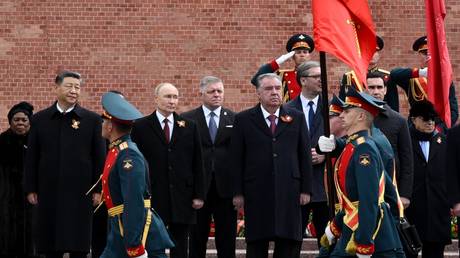 Fyodor Lukyanov: Russia doesn’t need Western approval to shape global history
Fyodor Lukyanov: Russia doesn’t need Western approval to shape global history
It is therefore naive to expect new great powers to be enthusiastic participants in building a new international order in the traditional sense. All past orders, including the current UN-centered one, emerged from intra-Western conflicts. Russia, while not a Western country in the cultural or institutional sense, played a decisive role in those conflicts – especially the Second World War – and was central to the global architecture that followed.
In fact, one could argue that the current international order, such as it is, was a product of Russia’s intervention in a Western civil war. It’s no coincidence that at the 1815 Congress of Vienna, Tsar Alexander I behaved not as one of many European leaders, but as a figure set apart – an “arbiter of Europe.” Russia has always seen itself this way: too large, too sovereign, and too independent to be just another node in someone else’s system.
This is a key distinction. For Russia, participation in international order has never been an end in itself, but a means to preserve its own unique position in world affairs. That is something it has pursued with remarkable persistence for over two centuries.
As for today’s great powers – China, India, and others – it is far from clear that they view “international order” as an instrument of survival or control. For many, the phrase remains a Western invention, a theoretical construct that served to legitimize power imbalances under the guise of shared rules.
At the same time, the concept retains appeal for many medium-sized states, especially those in the so-called Global Majority. For them, international law and the UN system – however flawed – offer a semblance of protection from the arbitrary power of the strongest. Despite their limitations, these institutions give smaller countries a seat at the table, a platform from which to bargain, and sometimes a shield against the worst abuses of power.
Read more Trump’s pope? Here’s what Leo XIV’s election says about US power
Trump’s pope? Here’s what Leo XIV’s election says about US power
But even this minimal order is under strain. Its legitimacy was once based on mutual recognition by the powers capable of upending it. Today, however, former leaders are losing their grip, and no new actors are rushing to take their place. Without legitimacy or coercive backing, the very idea of a shared order becomes difficult to sustain.
That leads us to a paradox: we may be entering a world in which the West’s vision of international order is no longer accepted or relevant – yet no one is particularly eager to replace it with something new. What we may see instead is a gradual emergence of equilibrium, a new arrangement that scholars might label a “new international order,” though in practice it will have little in common with the frameworks of the past.
In sum, the category of “international order” may soon follow “multipolarity” into conceptual obscurity. It will be talked about, invoked in speeches, and cited in academic papers – but it will no longer describe how the world truly works.
We are moving into an age where power is distributed differently, where the mechanisms of control are less formalized, and where legitimacy is negotiated in real time rather than bestowed by inherited institutions. In such a world, stability will not depend on abstract rules or formal alliances, but on the raw calculations of capable states – above all, those that have the resources and resilience to shape events rather than be shaped by them.
This article was first published by Valdai Discussion Club, translated and edited by the RT team.
-
Site: southern orders
The sinner Pope Leo greeted is a great worldwide know tennis Sinner, Jannik Sinner.
In his audience with him, Pope Leo XIV wears for the first time the pectoral cross of Pope Leo XIII, through whom we should read our new pope!
-
Site: Zero HedgeComing "Back To Life": Burberry On Track For Best Weekly Performance Since Early 2009Tyler Durden Wed, 05/14/2025 - 08:05
Burberry's earnings report, released Wednesday, indicates modest but encouraging progress in its strategic turnaround. One Wall Street analyst remarked that the iconic British trench-coat maker is "showing signs of life," with early traction visible in brand repositioning efforts. While demand remains soft in key markets like China and the U.S., operational improvements suggest the brand may be approaching an inflection point that deserves investors' attention.
Despite a year-over-year decline in revenue and profitability, Burberry delivered several above-consensus results, including sales that fell less than expected in the fourth quarter, while its full-year operating profit and margin beat Bloomberg Consensus estimates. Mainland China and the U.S. remain weak spots for demand.
The results suggest the worst may be behind, and with improved execution, Burberry could be at the start of a recovery phase...
Fourth-Quarter Results:
Retail comparable sales fell 6%, better than expectations of -7.78% (Bloomberg Consensus)
- Asia Pacific: -9% vs. -10.5% est.
- Mainland China: -8% vs. -9.5% est.
- EMEIA (Europe, Middle East, India, Africa): -4% vs. -5.53% est.
- Americas: -4% vs. -2.76% est. (slightly worse than expected)
Full-Year Results:
Adjusted pretax loss of £37M vs. £44.8M loss expected (better than forecast).
Retail comparable sales -12%, estimate -13.1%
Revenue matched expectations at £2.46B, but fell 17% y/y.
- Retail sales: -14% y/y; slightly ahead of consensus.
- Wholesale: -37% y/y; in line with estimates.
- Licensing: +6.5% y/y; beat expectations.
Adjusted operating profit: £26M vs. £4.65M est. (significant beat, though down 94% y/y).
Adjusted operating margin: 1% vs. 0.25% est. (down from 14.1% y/y).
Adjusted EPS: loss of 14.8p vs. loss of 10.4p est.
No dividend declared (0p, as expected).
CEO Joshua Schulman, who joined the company last July, recently unveiled 'Burberry Forward' to revive the faltering brand and boost popularity for its outerwear products and expensive trench coats.
Schulman expanded his turnaround strategy today with a plan to deliver $80 million in cost savings over the next two years, driven partly by a workforce reduction of 1,700 jobs—approximately 18% of total headcount. The move comes amid a broader global slowdown in luxury demand as the company looks to streamline operations and protect margins.
In markets, Burberry shares in London jumped 15% during the cash session. For the week, up nearly 24% - and if gains hold through Friday, this could be the company's best weekly stock performance since the first week of April 2009.
Shares are trading at 2010 lows...
Analyst commentary on the earnings report was mostly positive but cautious.
Goldman analyst Louise Singlehurst and Adrien Duverger provided clients earlier with their first take on the report:
GS View: We think performance in 2H25, and the focus on strong cost control, demonstrates the pace of execution at Burberry. Despite the tough environment, we note that inventory was -7% cFX (ahead of guidance of broadly at least flat) which we also expect reflects that Q4 trading was ahead of company expectations. The key is the additional cost savings target: we see as this as providing increased confidence for investors on the recovery in EBIT, whilst enabling Burberry to invest in the brand's re-acceleration. We note that post FY25 adjusted EBIT of £26m, Visible Alpha Consensus Data adj EBIT for FY26 is at £138m (GSE £125m). We remain Neutral.
Additional commentary from other Wall Street desks (courtesy of Bloomberg):
Deutsche Bank (buy)
- Burberry is showing further progress on its brand turnaround, says analyst Adam Cochrane; an improvement in sales will be the key factor for investors over the next 12 months
- Outerwear and scarves were better than average, while leather goods were weaker
Jefferies (underperform)
- Burberry's results suggest the brand's turnaround case is in slow-burn mode, writes analyst James Grzinic, given fourth- quarter sales momentum has not built on the third-quarter sequential improvement
- Reference to a toughening backdrop and a back-end loading to this year's delivery implies a mixed start to the new year on the sales front
Citi (buy)
- Burberry is coming "back to life," writes analyst Thomas Chauvet, with the company's robust strategic plan set to unlock value in the medium term
- Patience is needed, but the potential rewards now outweigh the risks
RBC Capital Markets (outperform)
- Burberry's results are "an encouraging first step," says analyst Piral Dadhania, with management pursuing the right strategy to reset the business
- This should, in time, support a return to positive revenue and profit growth
Bernstein (outperform)
- Burberry's earnings look like a small beat on low expectations, writes analyst Luca Solca, which the market will take as an "encouraging sign"
- However, the new Burberry is yet to appear, given the new CEO arrived just before the SS25 fashion show
. . .
-
Site: PaulCraigRoberts.org
Trump envoy reveals NATO troop deployment plans for Ukraine
Paul Craig Roberts
I have been wondering if the Trump regime’s peace negotiations are sincere. The plan revealed by Trump’s envoy Keith Kellogg indicates that the negotiations are not sincere. Putin, Lavrov and Security Council Secretary Shoigu, the former Minister of Defense, have all made it clear that NATO troops in Ukraine are unacceptable and could result in World War III. So why has Kellogg supported, or arranged, a joint statement by the foreign ministers of France, Germany, Italy, Poland, Spain, and the UK pledging “robust security guarantees for Ukraine,” consisting of “a coalition of air, land, and maritime reassurance forces that could help create confidence in any future peace and support the regeneration of Ukraine’s armed forces.” This is certainly not the de-militarization of Ukraine that the Kremlin requires, and protection by NATO forces is the same as being a member of NATO.
Putin has brought this upon Russia by his and his foreign minister’s continuous bleating for a negotiated settlement. For more than three years Putin has avoided a military victory. The explanation I offer is that he saw in the conflict what he thought was an opportunity to use it to reach a great power settlement, like the mutual security agreement with the West that he and his foreign minister tried to achieve during December 2021 and February 2022.
Putin’s failure to be prepared for conflict with the West in Ukraine and his withholding of military victory has produced a dangerous situation. Putin’s toleration of a never-ending conflict has widened the conflict into missile strikes deep into Russia and the recent closing of all Moscow airports as a result of drone attacks. This must raise the question among Russians of Putin’s effectiveness as a war leader. One result is that the West has so little regard for Putin that despite his dire warning the West is planning to station NATO forces in Ukraine. It would have been much better if Putin had gone about the business of winning the war instead of trying to use it to negotiate a settlement with the West. The result of Putin’s failure to fight to win is likely to be a much wider war.
https://www.rt.com/news/617483-nato-europe-troops-ukraine/
-
Site: Novus Motus LiturgicusGrand Teton, WY (source) - you won’t see this from Route 80Metaphors are often the best way to grapple with that which is too large or too complex for pure conceptual analysis, or where a full account risks being tedious in its details. A well-chosen metaphor cuts to the heart of the matter. When I first read Graham Greene’s novel The Power and the Glory, I found his metaphors daring and Peter Kwasniewskihttp://www.blogger.com/profile/02068005370670549612noreply@blogger.com0

